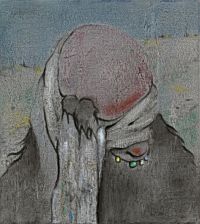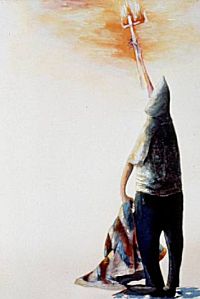|
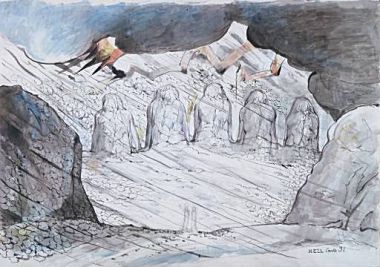
The Primaeval Giants
Sunk in the Soil
William Blake
1824-7
It is an easy thing to talk of patience to the afflicted,
To speak the laws of prudence to the houseless wanderer,
To listen to the hungry raven's cry in wintry season
When the red blood is fill'd with wine and with the marrow of lambs.
It is an easy thing to laugh at wrathful elements,
To hear the dog howl at the wintry door, the ox in the slaughter house moan;
To see a god on every wind and a blessing on every blast;
To hear sounds of love in the thunder storm that destroys our enemies' house;
To rejoice in the blight that covers his field, and the sickness that cuts off his children,
While our olive and vine sing and laugh round our door, and our children bring fruits and flowers.
Then the groan and the dolor are quite forgotten, and the slave grinding at the mill,
And the captive in chains, and the poor in the prison, and the soldier in the field
When the shatter'd bone hath laid him groaning among the happier dead.
It is an easy thing to rejoice in the tents of prosperity:
Thus could I sing and thus rejoice: but it is not so with me.
-
William Blake, from The Four Zoas
Re-Visioning William Blake's The Four ZoasDonald Ault .....................................................
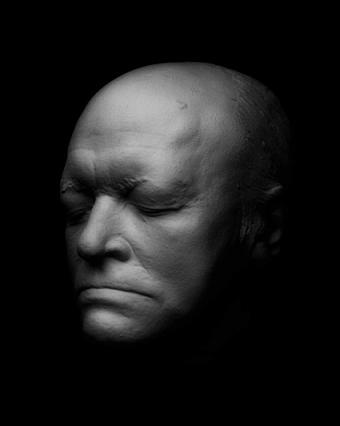
William Blake
b. November 28, 1757
photo of a life mask made in 1823
Joanna Kane
from Somnambulists
.....................................................
The William Blake Archive
The Complete Poetry and Prose of William Blake
edited by David V. Erdman
Blake Digital Text Project _______________________
Marlboro Democracy
Mark Zlomislic
ctheory
The future lies in cosmic solitude. I picture a weightless individual in a little ergonomic armchair, suspended outside a space capsule, with the earth below and the interstellar void above.
-
Paul Virilio, Interview with Jérôme Sans
Justice bleeds and is punished for its accusations.
Our skin stretched to the breaking point cannot forgive the government appointed torturer who performs her duties with angelic conviction.
The rose is without a why but the corpse is not.
Bits of flesh floating on the waves, falling off the broken trees after the tsunami's visitation.
Mad Max lives on to ride again together with John Wayne down a burnt out highway.
The kangaroo god will box them to a knockout.
...(more)
_______________________

Cafeteria, Pripyat
Chernobyl
Nadav Kander
via Jim Johnson
_______________________
The Credit Creature
Le Colonel Chabert
In the preamble to the spectacular crisis, the preferred metaphor - initiated by the US government and obediently repeated by mass media participants - was obstructed plumbing (with the unspoken but inescapable association with overflowing latrines) evolving quickly, given the assumed anthropomorphising of "the economy", into the metaphor of arterial blockage. Paulson, the surgeon, offered to perform an emergency bypass operation, the aptly named TARP with its additional diagnosis of financial septicemia. All this visually rich metaphorical language succeeded in creating an impresson of content density, of specificity and reference in reportage of the cause, symptoms and proposed treatments of the crisis. What could be more "real" than the flesh and blood (and shit) into which "the financial system" (with its property abstractions) and "the economy" (whose vital signs are presumed to be tracked by stock markets) were repetitiously transformed by this rhetoric? And yet this metaphorical embodiment of the financial system and the economy served principally to hide the bodies, to disembody the referents, that is to disguise the real relations between real people constituted by the financial "toxins" and "exotic" assets.
(....)
The rapidity with which shifts in the discourse concerning legitimacy and democracy - echoing through all versions of the question of language and bodies, of, that is, the role of credulity, credence, and credit in sustaining social relations - can be seen across the spectrum of brevetted opining requires no conspiracy, although it could look as though ninety percent of those with access to major media are responding to instructions received via chips implanted in their brains. The fact that the other ten percent of celebrity intellectuals do not respond properly, and that the smaller public media is flooded with disobedient comprehension, suggests that traditional mechanisms for promoting and rewarding obedience are adequate....(more)
_______________________

Job's comforters
William Blake
_______________________
Studs Terkel 1912 - 2008:
A Democracy Now! Special Tribute to the Beloved Oral Historian and Broadcaster
_______________________
Psychoanalysis: An Elegy
Jack Spicer
What are you thinking about?
I am thinking of an early summer.
I am thinking of wet hills in the rain
Pouring water. Shedding it
Down empty acres of oak and manzanita
Down to the old green brush tangled in the sun,
Greasewood, sage, and spring mustard.
Or the hot wind coming down from Santa Ana
Driving the hills crazy,
A fast wind with a bit of dust in it
Bruising everything and making the seed sweet.
Or down in the city where the peach trees
Are awkward as young horses,
And there are kites caught on the wires
Up above the street lamps,
And the storm drains are all choked with dead branches.
What are you thinking?
...(more)
My Vocabulary Did This to Me
The Collected Poetry of Jack SpicerWesleyan University Press
Jack Spicer
1925 - 1965
The House that Jack Built: The Collected Lectures of Jack Spicer
google books
Robert Creeley lecture on Jack Spicer and Robert Duncan
Naropa Poetics Audio Archives Jack Spicer at PennSound
Jack Spicer Feature
Jacket 7 _______________________
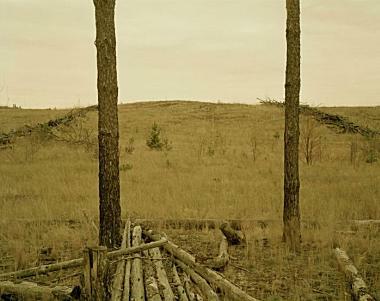
radioactive logs
Pripyat
Nadav Kander
_______________________
Second letter to Federico Garcia Lorca
Jack Spicer
Most of my friends like words too well. They set them under the blinding light of the poem and try to extract every possible connotation from each of them, every temporary pun, every direct or indirect connection - as if a word could become an object by mere addition of consequences. Others pick up words from the streets, from their bars, from their offices and display them proudly in their poems as if they were shouting, "See what I have collected from the American language. Look at my butterflies, my stamps, my old shoes!" What does one do with all this crap?
Words are what sticks to the real. We use them to push the real, to drag the real into the poem. They are what we hold on with, nothing else. They are as valuable in themselves as rope with nothing to be tied to.
I repeat - the perfect poem has an infinitely small vocabulary. ...(more)
_______________________
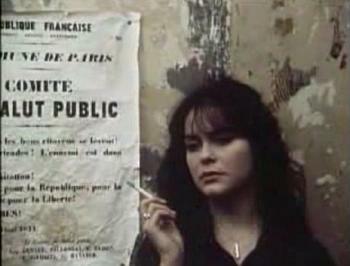
Derrida On 'Ghostly Hauntings'
... And Kafka's 'Ghost'
from Ken McMullen's improvisational
'Ghost Dance' (1983)
youtube
_______________________
Five Theses on Informational–Cognitive Capitalism
George N. Dafermos
Primitive accummulation has been completed; explosion now gives way to implosion. It was reckoned that a myth central to capitalism came full circle in three generations: I would start from scratch with empty hands and empty pockets, slowly but gradually accummulate rights and money, then build a house, find a wife with whom I would make a family, then have a son and raise him, and, sooner or later, die. My son would repeat the process once more, but his son — my grandson — would inherit more than my son did, say three times more. In the elapsed space of three generations, total wealth would have multiplied by nine times. This myth starts to shun all relevance: the historic magnification of capitalism, based on long-established materialist notions of value, is no longer feasible. In all probability, my grandson will not inherit three houses.
And here comes the reversal of perspective of Capital: as the concept of the Spectale is conceived to its full radicality, as a process of generalised social abstraction, the commodity-form implodes to encompass and invest all of shared lived experience. The commodity-form has gone well beyond the romantic stage of fetishism: while there is no doubt that both the use- and exchange value of a product now largely stem from intangible characteristics, such as perceived sex-appeal, "coolness", and ephemeral trendiness — a reality of contemporary commerce which compels us to rethink value along the lines of what Jean Baudrillard calls sign value — commodification does not stop at the twilight of shopfronts and commodity shelves, that is, the sphere of materiality, but it extends beyond them to encompass all of the immaterial. The leverage and diffussion of commodification has been so overwhelming that goods long considered public, such as century-old knowledges pertaining to medical treatments and the cultivation of the land have been appropriated.(....)
The internal need for continuous magnification, rather than ideology or class struggle, has led the convulsive reconfiguration of the convoluted mesh of power relations and the associated relations of production that are manifested as an intellectual property right. The organic composition of capital may well have undregone dramatic change, but the social worker of the present remains subordinated to a regime of spectacular oppression; a regime
that substitutes one class for another, yet still maintains its class-based dichotomic character; a regime that by Marx's definition may be seen as noncapitalistic, yet it is still epitomised by the axiomatics of capitalism.
To this day, the regime of signs founded on the emancipatory tendency of the "general intellect" negates the old regime of subordination and work done in factories and businesses, but it does so without negating its own Self. Consequently, although fueled by a desiring machine predicated on social ejaculation, it remains a regime of signs, rather than a concrete situation experienced in the urban territory....(more)
_______________________
Congratulations to the team at Language Log
The Linguistic Society of America announces the 2009 recipient of the Linguistics, Language and the Public Award, given for a body of work that has had a demonstrable impact on the public awareness of language and/or linguistics.
The award will be given to Language Log, a collaborative science blog devoted to linguistics and written by a team of more than a dozen prominent linguists, almost all members of the Linguistic Society of America...(more)
heads up from languagehat
_______________________
 photo - mw
_______________________
Around the pillars of Urthona, and round thy dark limbs,
On the Canadian wilds I fold, feeble my spirit folds.
-
William Blake, America A Prophecy

WR 25 And Tr16-244
Previously Unseen Mammoth Stars
Get The Hubble Treatment
_______________________
God Works in Mistaken Ways
E.R. Bills
Much has been made of late regarding the theory of evolution and how it’s taught in Texas public schools. For the next few months, the Texas State Board of Education will be considering changes to our children’s science curricula. The chairman of this board, a dentist named Don McLeroy, calls himself a Creationist and believes in a literal reading of the Bible. Cynthia Dunbar, a vocal board member, recently made news when she suggested that in the first six months of Barrack Obama’s presidential administration, he would collude with terrorists to bring down our nation.
I don’t know about you, but I wouldn’t trust a biblical literalist, much less an admitted Creationist to arrange my children’s sock drawer, much less instruct, presume to choose who instructs or definitively decide what gets instructed to my children in a public school setting, much less a science classroom. And Mrs. Dunbar — a conservative zealot who is so thoroughly brainwashed that she (according to her own website) believes that her role on the Board of Education includes ferreting out nefarious “socialist” and “humanist” agendas — has absolutely no business proposing or voting on anyone’s intellectual future, let alone our children’s....(more)
_______________________
 Circus
Vladimir Clavijo-Telepnev
Photography
_______________________
Life after bankruptcy
The age of privatisation is over.
Jürgen Habemas talks to Thomas Assheuer
Sign and Sight
What worries me most is the scandalous social injustice that the most vulnerable social groups will have to bear the brunt of the socialised costs for the market failure. The mass of those who, in any case, are not among the winners of globalisation now have to pick up the tab for the impacts of a predictable dysfunction of the financial system on the real economy. Unlike the shareholders, they will not pay in money values but in the hard currency of their daily existence. Viewed in global terms, this avenging fate is also afflicting the economically weakest countries. That's the political scandal. Yet pointing the finger at scapegoats strikes me as hypocritical. The speculators, too, were acting consistently within the established legal framework according to the socially recognised logic of profit maximisation. Politics turns itself into a laughing stock when it resorts to moralising instead of relying upon the enforceable law of the democratic legislator. Politics, and not capitalism, is responsible for promoting the common good. ...(more)via 3quarksdaily
_______________________
Naomi Klein on the Bailout Profiteers and the Multi-Trillion-Dollar Crime Scene
Democracy Now
_______________________
Bailout costs more than marshall plan, louisiana purchase, moonshot, s&l bailout, korean war, new deal, iraq war, vietnam war, and nasa's lifetime budget -- combined!
_______________________
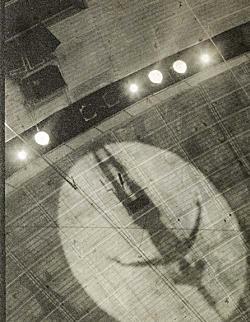
Vladimir Clavijo-Telepnev
_______________________
Cultural journals and Europe
Edouard Glissant
Translation by Niall Bond
eurozine
As a writer, I write in the presence of all the languages of the world, even if I only know one. Humanities today are developing a practical, divining sense of languages, and are using a far higher proportion of the capacities of the human brain. Multilingualism should not be boiled down to the development of the quantities of languages; it refers not only to a situation, but also to a new awareness, related to the way I frequent the poetry of the world. In this context, translation is indispensable, is increasingly a new genre among literary and artistic genres, and is also related to this new vocation: we cannot save a language by allowing others to perish, either inside Europe or beyond its borders. Should journals invent spheres and methods to promote new capacities in translation (for instance by publishing fundamental texts of other languages without translations) rather than simply building bridges between three or four dominant languages?...(more)
_______________________
The Tower of Babel does not exist
Clarisse Herrenschmidt
Translation by Mike Routledge
eurozine
Why have we reversed the linguistic significance of the Tower of Babel? I do not know. I do not even know anything about all the works that may have been concerned with this phenomenon. But let me at least put forward a thought.
The Tower of Babel is associated with knowledge: with the storming by men of heaven and of the unseen power enthroned there.
And for us, knowledge in turn is associated with languages, in their diversity and their difficulty. In Europe, since the philological revolution, knowledge has meant speaking one or more vernacular languages, reading Latin, Greek or Hebrew, in short, being able to write whatever can be written. Knowing means knowing different things: diversity is one of the essential characteristics of knowledge. For us, there is no such thing as single knowledge....(more)
_______________________
These days
whatever you have to say, leave
the roots on, let them
dangle
And the dirt
Just to make clear
where they come from
- Charles Olson
.....................................................
 Charles Olson
b. 27 December 1910
Photographs of Charles Olson
The Charles Olson Research Collection
.....................................................
In Cold Hell, In Thicket
Charles Olson
In cold hell, in thicket, how
abstract (as high mind is, as not lust, as love is) how
strong (as strut or wing, as polytope, as things are
constellated) how
strung, how cold
can a man stay (can men) confronted
thus?
Language even is made bitter, words
are made to taste like paper wars, get tossed up
like lead soldiers used to be
(in a child's attic) lined up
to be knocked down, as I am,
by firings from a spit-hardened fort,
as we are, here, from where we must go
God, that a man, as his acts must, as there is always a thing
he can do, he can raise himself, he raises
on a reed he raises his
Or, if it is me, what
he has to say
(....)
The branches made against the sky are not of use, are
already done, like snow-flakes, do not, cannot service
him who has to raise (Who puts this on, this dreaming of his flesh?)
he can, but how far, how sufficiently far can he raise the thickets of
this wilderness?
(....)
That it is simple, what the difference is -
(that a man, men, are now their own wood
and thus their own hell and paradise
that they are, in hell, or in happiness, merely
something to be wrought, to be shaped, to be carved, for use, for
other
does not, in the least, lessen his, this unhappy man's
obscurities, his
confrontations
He shall step, he
will shape, he
is already also
moving off
into the soil, on to his own bones
he will cross
(there is always a field,
for the strong there is always
an alternative)
But a field
is not a choice, is
as dangerous as a prayer, as a death, as any
misleading, lady
...(more)
A Taste of Olson
.....................................................
The Collected Poems of Charles Olson
google books
Collected Prose
Charles Olson
google books OlsonNow
A blog on the poetry and poetics of Charles Olson, edited by Michael Kelleher and Ammiel Alcalay
_______________________

Sand Boils
Struan Gray

Oskar Loorits,
and the teller of tales Marija Leite
Photo by: Lauri Kettunen
1920 Photographs of Liv Villages
1902-1927
The National Board of Antiquities
Finland
_______________________
Beyond Photography
Miroslav Kirin
eyeshot
A WANDERING, lost fragment: all the places mirroring the presence of God were dying. Ashes had covered everything, the one containing your friend and the friends of other friends, gray shades embalmed all things, the scattered bodies of the dead lie strewn across the town. The town has vanished.
(....)
A DREAM, 1993: abandoned letters, senders well known, now buried in the past, almost nullified by lapse of memory. There are a few piles, sorted out by their subjects. Someone, not me, takes the box with letters, takes out one letter after another and reads it with eager interest. Essentially, there is a whole array of unidentified readers, each of them taking turns at non-colliding intervals. All readers finally blur into one condensed image. Occasionally, the image may break into meaningless pieces, tempting you to work out the identity of each. At this point "you" is an addressee likely identifiable with the narrating "I" and, to cause even more confusion, this "you" will later become a "you" probably lost for good to any traceable identity or address. It is a business worth trying but pointless in the end. Are you him, or her, you may ask. The she-reader will take pleasure in quite different matters than the he-reader. It is quite obvious, isn't it, but you nevertheless fail to guess the exact scope of her or his interest. Who will fail to resist the temptation and read other man's letters, who is more inclined to do it? The decision has been made instantaneously. Here, before this man's (or woman's?) eyes, in a series of flashes, one after another, unfold the scenes from lover's written life, the one which may not be as it appears to be. Here, dear stranger, are the letters you could have received and read to the point of your vanishing in them. Seemingly, you are reading them to fathom my intimacy but you can only fuel your dark voluptuousness by disclosing the layers of tender experience, by shedding light to the secrets you used to ponder. Oddly enough, my indelicate reader, you only tend to organize your own shattered self - no matter how meticulously you worked bent over these papers, you will not find me in them. The she you might as well have been looking for will not be there either. Here is why: you seem to lack a capability to encompass a unique vision of someone's life, those small things hidden from the distracted eye. You can handle words with enviable virtuosity, make them subject to your oddities, but when it comes to delicacies of male-female relationships you seem to withdraw from the boiling scene. And think about this: all intimacy must have vanished from these papers the moment you set your eyes on them. Do not ask why. I could figure out your identity: I was probably seeing you, perhaps we have met and talked on the town's wide square enjoying the cool summer breeze under the lime trees. In this dream the letters were read by someone very familiar. Presently, I cannot recall the face but neither can I imagine a complete stranger doing it. Yes, I am positive about it now: we shared the passion for the same girl, the one consumed in letters, mine and yours, the one locked in "incomprehensible" sentences and phrases, the one creating a world of silence in our past conversations, the one who further divides the world already divided . ...(more)
Miroslav KirinCroatiaPoetry International Web
.....................................................
My Tongue Falls out of My Mouth
Miroslav Kirin
Translated from the Croatian by Miroslav Kirin
words without borders
my tongue falls out of my mouth
it is no longer a tongue, it is a huge calf's liver
of the calf we slaughtered yesterday
assures me the butcher of my favorite butcher shop
but I didn't go to the butcher shop
and neither do i have a favorite butcher shop
it is my tongue that has fallen out of my mouth
this huge liver
i'm putting it back pushing it into my throat
i give up when i realize that it is choking me
my tongue falls out again
hangs onto me creeps up my neck licks my body
through my tongue through my tongue through my most grievous tongue
_______________________
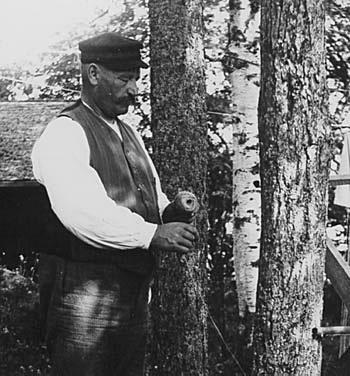
"A Thousand Unknown People"
(Tuhat Tuntematonta)
The National Board of Antiquities
Finnland via Ramage
_______________________
The Collected Poems of Barbara Guest
Wesleyan University Press
From the Book:
Lo, from the outside a poem is with us, of another composition.
Travelled from an antique place.
Writing, narrow and sparse, pungent as the lemon tree.
Difficult, spelling and montage.
We have built no large hall to labor in.
We sleep on small cushions for as long as we wish.
Our lives are composed with magic and euphony.
-
“Composition,” from The Red Gaze
.....................................................
Barbara Guest
(1920 – 2006)
Barbara Guest Feature
Jacket 10
The Red Gaze
Barbara Guest
google books
Miniatures and Other Poems
Barbara Guest
google books
_______________________

Entrance to Central Waiting Hall
Penn Station
Louis Stettner
b. Nov. 7, 1922 - 1958
_______________________
Bad Faith
Lebbeus Woods
We seem poised to enter a new era of the control and regulation of private life by the public institutions of government. The reason, it is becoming clearer every day, is that too many individuals in key positions of authority and responsibility have abused their privilege of freely choosing their courses of action, by serving their own interests at the expense of the interests of the wider public. This is equally true in politics (where ideological fantasies trumped reality), finance (where greed for short-term profits did the same), industry (felled by sloth and stupidity), and commerce (debt-financed consumerism and damn the consequences—won’t the party go on forever?). So, new leaders are being brought in and must use their authority to try to repair the damage done and set the society on a new and healthier course. It is an extraordinarily difficult task that will require—given the complex interconnectedness of everything today—unprecedented degrees of centralized control. Regardless of anyone’s political philosophy, there is no other choice. The SOS has been sent. What we’re talking about now is not the best of all possible worlds, but survival....(more)
_______________________
What Next?
The Elections, the Economy, and the World
Noam Chomsky
Audio - Transcript
It was a historic election. To have a black family in the white house is a momentous achievement. In fact, it’s historic in a broader sense. The two Democratic candidates were an African-American and a woman. Both remarkable achievements. We go back say 40 years, it would have been unthinkable. So something’s happened to the country in 40 years. And what’s happened to the country- which is we’re not supposed to mention- is that there was extensive and very constructive activism in the 1960s, which had an aftermath. So the feminist movement, mostly developed in the 70s-–the solidarity movements of the 80’s and on till today. And the activism did civilize the country. The country’s a lot more civilized than it was 40 years ago and the historic achievements illustrate it. That’s also a lesson for what’s next.
What’s next will depend on whether the same thing happens. Changes and progress very rarely are gifts from above. They come out of struggles from below.(....)
...(more)
_______________________
Waiting for Lefty
Jeff Sharlet's afterword to Dispatches from The Religious Left edited by Frederick Clarkson
The Revealer
The writers and activists gathered here span the spectrum from liberal to left, from electorally-inclined to the theologically revolutionary. But none of them are willing to give an inch on that core value of both democracy and American faith: the conviction that everybody—soccer moms and sex workers, cowboy preachers and radical faeries—counts. The new religious centrists too often forget that fact. What we learn from this collection is that for the Religious Left to merit capitalization, for it to be a real movement, it’s going to need to bring the liberals and leftists and all the wild-eyed ones together.
The movement that can do that doesn’t exist. But it could....(more)
_______________________

Eugène Ionesco
b. Nov. 26, 1909
still from
An Interview with Eugene Ionesco
youtube
"I thought that it was strange to assume that it was abnormal for anyone to be forever asking questions about the nature of the universe, about what the human condition reaaly was, my condition, what I was doing here, if there was really something to do. It seemed to me on the contrary that it was abnormal for people not to think about it, for them to allow themselves to live, as it were, unconsciously. Perhaps it's because everyone, all the others, are convinced in some unformulated, irrational way that one day everything will be made clear. Perhaps there will be a morning of grace for humanity. Perhaps there will be a morning of grace for me."
-
Eugene Ionesco, Extract from "The Hermit", 1973
_______________________

Photo by: Lauri Kettunen
1920
Photographs of Liv Villages
1902-1927
_______________________
Human Blindness
John Lachs
I have distinguished ten different sorts of blindness, undifferentiated by James, all of which, however, are hinted at in his essay. Some of the blindnesses are connected with each other in a variety of ways, others remain essentially independent. They are different from each other because their objects, causes, organs, processes or remedies differ. But they tend to travel in company so that, for instance, the person who is blind to immediacies is likely also to be nescient of how others see the world. Similarly, persons who take no delight in our simpler functions probably also fail to lead an intense sensory life.
Should we be distressed at seeing so much blindness built into the human frame? If blindnesses are deficits of a cognitive, valuational or emotive sort, it would presumably be much better to be without them. James certainly conceives his essay as a call to action: he laments our inattentions and implies, even though he does not state, that we must overcome them and try to see the neglected riches of life. Surprisingly, perhaps, he says nothing about blindness to ourselves in the form of self-deception and the sort of subconscious impulses Freud worked so hard to bring to the light of day, but he clearly considers unseeing a severe human failing. He may not go so far as his colleague, Royce, and say that the willful narrowing of attention is the very definition of sin, but he is convinced that we would be better off if we lived in total conscious possession of our world or at least significantly expanded the range of our sympathies.
Can we rid ourselves of what James calls the "great cloud-bank of ancestral blindness"?...(more)
William James Studies 3.1 (2008)
_______________________
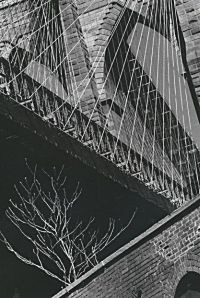
A Brooklyn Tree Grows
Under the Brooklyn Bridge
Louis Stettner
1986
_______________________
And so they went on, the fourbottle men, the analists, ungu-am and nunguam and lunguam again, their anschluss about her whosebefore and his whereafters and how she was lost away away in the fern and how he was founded deap on deep in anear, and the rustlings and the twitterings and the raspings and the snappings and the sighings and the paintings and the ukukuings and the (hist!) the springapartings and the (hast!) the bybyscutt-lings and all the scandalmunkers and the pure craigs that used to be (up) that time living and lying and rating and riding round Nunsbelly Square. And all the buds in the bush. And the laugh-on the greene, agirlies, the gretnass of joyboys, from Pat Mullen, Tom Mallon, Dan Meldon, Don Maldon a slickstick picnic made in Moate by Muldoons.
-
Joyce, Finnegan's Wake
_______________________

Odd Man In
1958
Penn Station Series
Louis Stettner
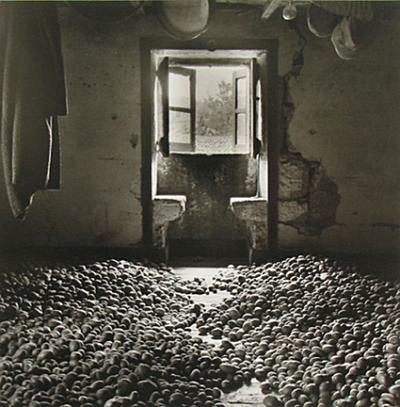
Potatoes
Migration
© Rachel Brown
via Twiglog
_______________________
Karrer's monologue from Bela Tarr's Damnation
courtesy of Spurious
I sit by the window and look out completely in vain. For years and years I've been sitting there and something always tells me I'll go mad the next moment. But I don't go mad the next moment, and I have no fear of going mad because fear of madness would mean that I'd have to cling to something. Yet I don't cling to anything. I cling to nothing, but everything clings to me.
They want me to look at them. To look at the hopelessness of things. To watch as a scruffy dog outside my window under the pewter sky in the torrential rain walks up to a puddle and has a drink. They want me to watch the pitiful effort everyone makes in trying to speak before they drop into the grave. But there's not time for they are already falling. And they want this irreversibility of things to drive me mad, but the next second they want me not to go mad. ...(more)
_______________________
Hereabout the Larch Trees End
Ger Killeen
What will we do without wood? In my voice I carry leaves clawed out of Cambrian caves. Is this a kaddish for oaks? Are these orisons for pit ponies? The antiphon of the engines chews out a palatial fantasy for starry generations to come after. In this idiom the word “yesterday” is only used in contexts of inevitability: See under tomorrow, see under nuclear fusion, see under colonies of Mars. And when the Red Sea opens a passage you discover if you’re a chosen one or a charioteer in Pharaoh’s army.
.....................................................
Erebus anad Terror
Ger Killeen
.....................................................
Numerous Stone Marks and Several Caches
Ger Killeen
Space is always a stand-in for time, glyphs and pictures the first line of defense against the disorders of memory. Five loaves and two fishes; a fatted calf; the ambivalence of things seen. The problem is that everything half-works until policy precipitates a famine. Suddenly, then, the kitschy cladding falls away from the engine of history and you hear the gearwheels of power recalibrating bounty. Providence, Providence, Providence. Empire’s fire and Peel’s brimstone. Perhaps I fled here to mark the progress of a disease, those middle voices that sequester the middle passage in pious ejaculations. After all, ich am of Irlaunde: in the chill and stupor of truths we toast Her Majesty with bumpers of paranoia and bile, bestow names like salt.
The Green Integer Review
Nos. 11-16 (January-December 2008)
_______________________
 living constructions
Eyal Pinkas via The Exposure Project
"The adaptations I am making can be best described as studies on the question of how something would appear if it were able to assume the identity it secretly desires."
-
Eyal Pinkas interview
This Is That
_______________________
As I reflect over the extraordinary year covered by this journey in Time, the old regime soon banished to exposure & shame, our first black president should turn things upside-down & begin by radically changing NASA’s role & priorities from celestial space to space here on earth, to finding innovative ways to house the homeless. It reminds me of the week when they placed a detention cell similar to those used at Guantanemo up on Congress, where passersby looked in only to find accommodations, clean bed, sink, toilet, far superior to those for many on the street. Not knowing where you’re going in a poem carries with it similar aspects of the uncanny. In that sense, I don’t know whether this return home may even be another leaping-off point for a journey, who knows where?
-
Robert Gibbons
A Lot of Accidental Love
Saturday, November 24, 2007
"There’s a lot of accidental love in the world despite so much crass indifference."
So began Robert Gibbons' Log a year ago.
Many thanks for sharing your sensibilites and voice through the last strange year - mw
_______________________

Theater of War:
Portrait of a Homeland Security State
Lindsay Beyerstein interviews Nina Berman
_______________________
This Is Change?
20 Hawks, Clintonites and Neocons to Watch for in Obama's White House
Jeremy Scahill
.....................................................
How much solace, and for how long, will we continue to take from the ‘better than Bush’ sentiment?
- Eliot Gelwan
_______________________
Kabul 30 years ago, and Kabul today. Have we learned nothing?
Robert Fisk
This is not déjà-vu. This is déjà double-vu. And it gets worse.(....)
I prowl through one of the Pakistani retread books I have found and discover General Roberts of Kandahar telling the British in 1880 that "we have nothing to fear from Afghanistan, and the best thing to do is to leave it as much as possible to itself... I feel sure I am right when I say that the less the Afghans see of us, the less they will dislike us".
Memo to the Americans, the Brits, the Canadians and the rest of Humpty Dumpty's men. Read Roberts. Read history....(more)
Obama has to pay for eight years of Bush's delusions
Robert Fisk
_______________________

Theodor Horydczak
with camera
ca. 1920
Washington as It Was
Photographs by Theodor Horydczak
1923-1959
_______________________
U.S. Pledges Top $7.7 Trillion to Ease Frozen Credit (Update2)
Mark Pittman and Bob Ivry
Bloomberg
_______________________
Zombie Economics
James Howard Kunstler
Though Citicorp is deemed too big to fail, it's hardly reassuring to know that it's been allowed to sink its fangs into the Mother Zombie that the US Treasury has become and sucked out a multi-billion dollar dose of embalming fluid so it can go on pretending to be a bank for a while longer. I employ this somewhat clunky metaphor to point out that the US Government is no more solvent than the financial zombies it is keeping on walking-dead support. And so this serial mummery of weekend bailout schemes is as much of a fraud and a swindle as the algorithm-derived-securities shenanigans that induced the disease of bank zombification in the first place. The main question it raises is whether, eventually, the creation of evermore zombified US dollars will exceed the amount of previously-created US dollars now vanishing into oblivion through compressive debt deflation.
My guess, given the usual time-lag factor, is that the super-inflation snap-back will occur six to eighteen months from now. And the main result of all this will be our inability to buy the imported oil that comprises two-thirds of the oil we require to keep WalMart and Walt Disney World running. At some point, then, in the early months of the Obama administration, we'll learn that "change" is not a set of mere lifestyle choices but a wrenching transition away from all our familiar and comfortable habits into a stark and rigorous new economic landscape....(more)
_______________________
Atlas Shrugged
Updated For The Current Financial Crisis
By Jeremiah Tucker
McSweeney's
_______________________
Frightened Global Overdose
Michael Helsem
Within is mournful pandemonium dazzled
Nothing so only as a calico or killing as this bough
This is what it is staring arc of instability
Thriving joy comatose brings welcoming eyes
Surely anything that is common unimaginable
In front of us it's not a world it's a plan
Possibly it was to blog scepticism
Into a torn a dumb rumor of predictions
Might you not emerge a kind of god
3by3by3
Recipe
Pick 3 stories from Google News. Using only words that occur in the first 3 paragraphs of each story, make a poem with 3 stanzas, 3 lines each, no more than 60 characters per line. The 3-word title should use a word from each story.
_______________________
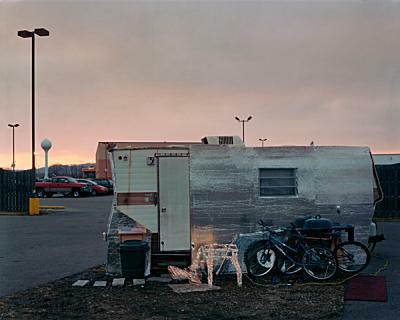
Treasure Island Casino
Red Wing, Minnesota
The Last Days Of W
Alec Soth
_______________________
Shreds
Ellen Ombre
Translated from the Dutch by David Colmer
words without borders
I was born in Surinam in the district of Commewijne. Some of the plantations in that fertile, once-wealthy district had meaningful names: Mon Souci, Mon Trésor, Peace and Delight, Mutual Care.
I come from Spite and Remorse.
Most of the plantations no longer exist. Abandoned by their inhabitants, the buildings collapsed.
Sluices silted up and fields became swamps and breeding grounds for caiman. The trading stations fell prey to parasites, weeds and choking liana. Slowly, the jungle took over. Sometimes a royal palm sits enthroned above all that rampant vegetation. Or, witness to faded glories, a tall hedge of flowering coral trees, which once shaded rows of coffee.
I was taken away from Spite and Remorse when I was four, or maybe five years old. The events that took place in my life before I had to leave my relatives to be delivered to the city as a foster child continued in an underworld of spirits and shadows. Nothing there is palpable, but the vague ghosts who live on silently in my dreams could very well stand for a father, a mother, brothers and sisters....(more)
_______________________
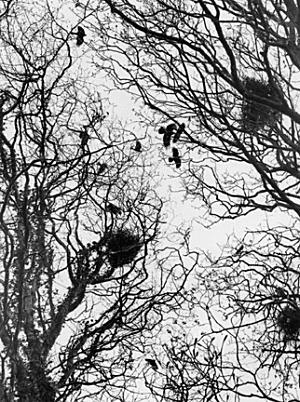
Rooks
Sweeney's Flight
© Rachel Brown
_______________________
I WAKE and feel the fell of dark, not day.
What hours, O what black hoürs we have spent
This night! what sights you, heart, saw; ways you went!
And more must, in yet longer light’s delay.
With witness I speak this. But where I say
Hours I mean years, mean life. And my lament
Is cries countless, cries like dead letters sent
To dearest him that lives alas! away.
I am gall, I am heartburn. God’s most deep decree
Bitter would have me taste: my taste was me;
Bones built in me, flesh filled, blood brimmed the curse.
Selfyeast of spirit a dull dough sours. I see
The lost are like this, and their scourge to be
As I am mine, their sweating selves; but worse.
Gerard Manley Hopkins

Arch of Lucius Septimius Severus
(AD 146-211)
Leptis Magna
_______________________
Simple questions?
Ashur Atwebi
Are these birds or caravans
swimming through the air?
Neither the blueness nor those seated on beds in warm rooms will say.
Are these houses in a mirage or Bedouins
fleeing from ancient winds?
The sand and foxes alert for centuries will follow their trails.
Are these shadows of a city or a quavering flute?
A scene and visions emerge from its darkness.
quoted in
Libya: Don't Look Away
Forrest Gander on Ashur Atwebi, Khaled Mattawa and the Medusa heads of Leptis Magna
_______________________

Leptis Magna
fotos de Libia
_______________________
from
White Birds in a Black Space
Ashur Etwebi
Translated from the Arabic by Ashur Etwebi
words without borders
He said:
I didn’t go to the sea this evening.
I was stopped by a wailing stone.
Two stab wounds in its chest
I asked it: Who—?
It answered: You—.
The faces that fell down
from the cloud of life have passed this way,
broken, crying and shadowless.
The wrinkles and the old winters’ fat were taken away by the traveling ships.
He said:
I see them planting the seeds of desire,
They were kings, sitting in the cafés of silver.
I see them in the large halls, on the noble marble
featureless.
The bird that has returned home,
remained dreaming till morning,
released the olive oil traders from jail
and poured the oil.
He said:
Many will pass through these places
but the sand remains the sand.
Oh, young sand, you have become a catastrophe.
Birds of the dear country build their nests in you;
the upper houses and the lower houses flourish
and he who walked with the beating of drums
wanted to reach it.
The country has besieged all kings and betrayed the prophets.
...(more)
_______________________
What pulls the heart
Stan Goff
Privilege, even temporary privilege, is simultaneously liberatory and amnesiac. So many of the people who have the freedom to think through and write about these things have been unbound — by whatever confluence of circumstance. They are to whatever extent no longer experiencing the same world that most of the rest of humanity experiences. And as we are wont to do with much trauma, we bury the bad experiences and avoid kicking the dirt off of them. In that process, we can “forget” where we came from. That’s the danger, and I’ll come back to that.
But many many people — including the so-called middle-class, whose privilege is dependent on conformity, obedience, and anesthesia (entertainment being the most common form) — experience their lives as moving from one form of confinement to another, day in and day out. Work is a place of confinement. Home and family are different forms of confinement, when this is the place we go to isolate ourselves, when this is where we sit out our dread of the future, when this is where we are abused or taken for granted, or when we rankle against responsibility (moslty a man’s thing, this last one).
Our state of confinement more generally is a state of poverty, or debt, or illness, or combinatons of those, and — most of all — the separation from and suppression of our own creativity and right fellowship with others. When hope is lost of release from confinement, then we come to look forward to what’s left — anesthesia. And, of course, for many — around 2 million here in the US — confinement means state confinement in human holding pens called prisons.
Much of our brokenness can be described in one way or another as captivity....(more)
_______________________

Village historian in his study
Philip Lieberman Collection
Tibetan & Himalayan Digital Library
via Plep - NY
_______________________
Flight from ‘The Ten Thousand Things’
Martin Anderson reviews Recollections of Being by Nathaniel Tarn
.......Cloud around tree outside the window
in which, at a sudden movement of mind,
all is contained again. Not to be here —
but there, in the cloud, and to be there
as a being here of which, in other wise,
there is no conception.
The dissipation, that is, of that sense of a separate self without which any authentic move outward to the human or non-human phenomena of our environment is postponed. Transcending such sense the observer in the poem, watching birds feed, imagines a state of being where the birds become ‘all others’ being and my own’:
Tree
itself at home in cloud, cloud in sky,
to furthest worlds, all single dwelling
of this unity.
This ‘unity’, playing upon the idea of no-mind by reinstating the word ‘mind’ from the end of the poem’s second line, Tarn evokes in a later line of the poem: ‘the absent-minded in full preoccupation/ with the ten thousand things’. In this process of removal, as an inhibiting presence, of the identity of the separate self:
Not to be here —
but there, in the cloud, and to be there
as a being here of which, in other wise,
there is no conception.
...(more)
Selected Poems 1950–2000
Nathaniel Tarn google booksreviewed by Brenda Hillman
Lyrics for the Bride of God
Nathaniel Tarn
google books
The Embattled Lyric:
Essays and Conversations in Poetics and Anthropology
Nathaniel Tarn
google books
_______________________

Henri de Toulouse-Lautrec
b. Nov. 24, 1864
_______________________
Ernst Herbeck (1920 - 1991)
a site by Gary Sullivan
thanks to Nick Piombino
The Cave
Ernst Herbeck
As rock round the cave was.
The bear standing in front.
the song a teddyberry and sang.
what am I supposed to do with it?
As me he saw so friendly to us!
The big day was there for me.
The cave in Virginia.
There the throbbing faded and a
song aroused.
Translated by Oya Ataman and Gary Sullivan.
.....................................................
Ernst Herbeck
Twelve Poems
Translated by Gary Sullivan
fascicle
_______________________

Camp Life In The Woods And The Tricks Of Trapping And Trap Making
Comprehensive Hints On Camp Shelter, Log Huts, Bark Shanties, Woodland Beds And Bedding, Boat And Canoe Building, And Valuable Suggestions On Trappers' Food, Etc. With Extended Chapters On The Trapper's Art, Containing All The "Tricks" And Valuable Bait Recipes Of The Profession; Full Directions For The Use Of The Steel Trap, And For The Construction Of Traps Of All Kinds; Detailed Instructions For The Capture Of All Fur-Bearing Animals; Valuable Recipes For The Curing And Tanning Of Fur Skins, Etc., Etc.
W. Hamilton Gibson
1850-1896
_______________________
A New Devil’s Dictionary
Celebrating Ambrose Bierce’s centennary, the Corpse is inviting readers to submit entries for our new Devil’s Dictionary. The one below is an example, by the Editor.
_______________________
Recognition Failure Horror
John Kinsella
agni
Years you’ve been walking around this place.
Something compels you outside to walk again:
grating crow-calls, incessant twitch of wagtails,
a breeze that can’t open anything cool
in this harsh summer morning. There
is no moisture to be sucked out of anything,
but this should also be familiar. Outside,
walking trails worn as if hundreds of sheep
made daily use of them, but none do, only
you, small animal life and insects crossing
erratically, or in set-patterns that don’t declare
themselves to you, or if they have in the past,
no longer do so. A branch of jam tree snapped
under the weight of mistletoe has dried to crumbling,
and you don’t remember when it fell,
though you recall you’re always vigilant.
...(more)
_______________________

David Tudor and John Cage
Tapestry of the Times #1
Leadbelly; Grupo Changui de Guantanamo; Hassan Kassayi; Woody Guthrie; Mary Lou Williams; John Cage/David Tudor; et al
WYPR: Baltimore
thanks to Thivai Abhor (Dialogic)
_______________________
A Document of Listening
H L Hix in conversation with Philip Metres
jacket
H.L. Hix’s recent work, God Bless: A Political/Poetic Discourse (2007), comes almost entirely from speeches made by George Bush and Osama Bin Laden, which Hix transforms to create poems in various traditional Western and non-Western forms, from the sestina to the ghazal. It is a fascinating project, demonstrating an aesthetic attention that becomes a kind of ethical and political attention, a close reading of the first order. A document of close listening, God Bless aptly demonstrates the profound lack of listening at the heart of this administration’s decision-making process. Documentary poetry, in Hix’s rendering, becomes a kind of history lesson for the poet and his readers, a way of reading into the archive and thus extending the archive into poetry, poetry as “extending the document.” ...(more)
Philip blogs at Behind the Lines: Poetry, War, & Peacemaking_______________________

Old Man at Celeyran
Toulouse-Lautrec
1882
_______________________
The Perpose
Ernst Herbeck
Wherever deep in the woods the perp also is.
There I fallow my woman and has its ounce
dow, the woods downward deep into being
hark I hear my voice again the
perp in the
woods.
Translated by Gary Sullivan and Oya Ataman.
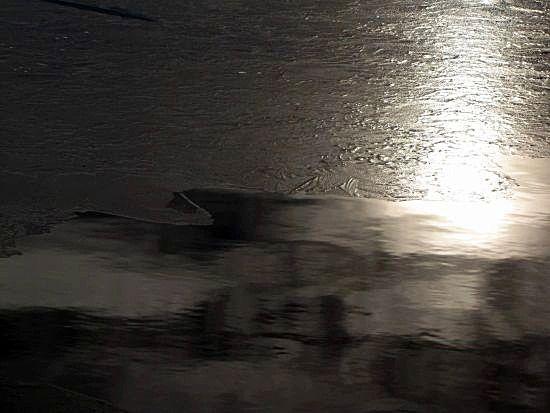 first ice
photo - mw
_______________________
from
The Echanges II
Robert Kelly
there is in language a temperament of fear
to answer the animal is to talk about syllables
pure as a lake in Siberia
salty & rush-ridden centuries from the sea
to which a river flows backwards Christmas night
or gull's hornpipe lowly to the cross in deep snow
when they hanged the first king: whose strangled throat
made consonants
in the forests vowels
invented with the cprice of the unicorn,
goat-eyed red-bottomed mandrills at horizons,
perpetual song of lemurs: ururur, sylabbles,
Aurora bloody-fisted from the Caspian lake,
erect
the Madman' Vision a vision into
image or into form?
Adam's allergy to the first bite retched into speech?
SET
Edited and published by Gerrit Lansing
1961
Includes:
Robert Duncan, Charles Olson, Stephen Jonas, Edward Dorn, John McGavern, Robert Kelly, John Wieners, Frater Perdurabo, Gerrit Lansing.
SET 2
1963
features
LeRoi Jones, Diane Wakoski, Robert Kelly, Kenward Elmslie, John Wieners, Stephen Jonas, Gerrit Lansing.
Both available here
via Lumpy pudding
_______________________
we build storees from
seeing it ovr n ovr til
we see what happend
what to let go
uv
- bill bissett, memoree

bill bissett
b. nov 23 1939
youtube bill bissett at PennSound Bill Bissett: Essays on His Works
edited by Linda Rogers
Google Books
.....................................................
from
Kontest Carnage
bill bissett
langwage binds us 2gethr separatelee n parts n sharing
almost replikating nevr reelee xact wun uv th biggest communal
spells we ar allbound n unbound in
ths xcellent documentaree is not th veree great ingrid bergman gregory
peck starer direktid by alfred hitchcock with dreem sequens by salvador
dali wun uv th best mooveez evr made ths spellbound is a wickid
inspiring anxious making n veree suspensful documentaree abt th
amayzing spelling beez
spelling beez start out lokal regyunal n build up 2 th nashyunal finals
like all uv th kontest worlds like dogs beautee talent politishyns
etsetera
bill bissett in Geist .....................................................
they cut back sew much on th backs uv th poor
bill bissett
in the whirlwind
drawings, poems and performances by bill bisset
_______________________
Hate/Code
William Pawlett
Kritikos V.6, October-November 2008
This paper examines Jean Baudrillard’s concept of the Code and applies it, briefly, to the urgent issues of hatred and violence. Baudrillard’s little-known notion of the “the hate” is explored in detail and the psychoanalytic terminology re-deployed in his work on hatred is clarified. Though Baudrillard never explicitly linked his notion of the Code to hatred, an argument is made that these concepts are closely related and that, placed in conjunction, they offer new and compelling ways of thinking about both hatred and its alternatives. This paper provides the theoretical groundwork to such an analysis; subsequent work will attempt a ‘radical empiricist’ exploration of hatred through case studies.
Finally the figure of the Other and radical alterity, frequently evoked by Baudrillard, is central to my closing suggestion that radical alterity provides an alternative to, or protection from, the hate.
Kritikos:an international and interdisciplinary journal of postmodern cultural sound, text and image
A Way of Proceeding:
Joseph Beuys, the Epistemological Break and Radical Thought Today
Gerry Coulter
Meaninglessness in the Desert of the Real
or
the Form of Meaning and Unpretentious Objects
Rebecka Molin
via Philosophy's Other
_______________________

Mipoesias
edited by Didi Menendez _______________________
Choosing Not to Look: [PDF]
Representation, Repatriation, and Holocaust Atrocity Photography
Susan A. Crane
History and Theory
_______________________
Societies worse off 'when they have God on their side'
Ruth Gledhill
times online
Religious belief can cause damage to a society, contributing towards high murder rates, abortion, sexual promiscuity and suicide, according to research published today.
According to the study, belief in and worship of God are not only unnecessary for a healthy society but may actually contribute to social problems.
The study counters the view of believers that religion is necessary to provide the moral and ethical foundations of a healthy society.
The paper, published in the Journal of Religion and Society, a US academic journal, reports: “Many Americans agree that their churchgoing nation is an exceptional, God-blessed, shining city on the hill that stands as an impressive example for an increasingly sceptical world.
“In general, higher rates of belief in and worship of a creator correlate with higher rates of homicide, juvenile and early adult mortality, STD infection rates, teen pregnancy and abortion in the prosperous democracies.
“The United States is almost always the most dysfunctional of the developing democracies, sometimes spectacularly so.”
...(more)
Journal of Religion and Society
_______________________
Al Purdy, Sam Solecki, and the Poetics of the 1960s
Frank Davey
In Canadian criticism there are at least three mythologies about English-language poetry in the 1960s. One is that it led what George Woodcock called "an enormous quantitative expansion" of Canadian writing (13): a democratization of writing and publishing that saw the number of poetry books published annually multiply dramatically throughout the decade, and the location of poetry production move significantly from the academy to the street. A second is that marked a shift from the print poetry of high modernism to the oral and performance poetry of postmodernism. A third is that it marked an Americanization of Canadian poetry: the introduction of individualist poetics that threatened what Robin Mathews has theorized as Canadian consensual continuities....(more)
via mirabile dictu
_______________________

El Lissitzky
Nov. 23, 1890 – Dec. 30, 1941
the constructor
selfportrait
1924
"Monuments of the Future": Designs by El Lissitzky
(Getty Research
Institute)
_______________________
... the main task of the ruling ideology is to impose a narrative that will not put the blame for the meltdown onto the global capitalist system as such, but on, say, lax legal regulations and the corruption of big financial institutions. Against this tendency, we should insist on the key question: which “flaw” of the system as such opens up the possibility for — and continuous outbreaks of — such crises and collapses?
The first thing to bear in mind is that the origin of the crisis is a “benevolent” one. After the dot-com bubble exploded in the first years of the new millennium, the decision across party lines was to facilitate real estate investments to keep the economy growing and prevent recession. Today’s meltdown is the price paid for the United States avoiding a prolonged recession five years ago.
The danger is that the predominant narrative of the meltdown will be the one that, instead of waking us from a dream, will enable us to continue to dream. And it is here that we should start to worry — not only about the economic consequences of the meltdown, but also about the obvious temptation to reinvigorate the “war on terror” and U.S. interventionism in order to keep the economy running.
- Slavoj Zizek
_______________________

Anxious People
El Lissitzky
1923
_______________________
Think of those grainy news reels from 1929 and the early 1930s. We used to feel smug about them. How dumb those policy makers were not to understand that you had to pump sufficient liquidity back into the system to keep the economy from collapsing? (We were taught that in Economics 101---oh, I forgot, when I took Economics 101 Keynesianism was still in vogue. Now in Economics 101, students learn the idiocies of Friedmanism and its successor doctrines, a perfect brew for cooking up a depression.)
-
James Laxer
 photo - mw
_______________________
from
Seeing the Light
Joseph Duemer
I promise never to say anything again
about my family or the calamities of spirit
they visited upon me. Today I went
with one of my dogs out into the woods,
where it is fall. The leaves transfused
by late afternoon sunlight preformed a glory
no memory of hurt can erase or ruin.
...(more)from Magical Thinking (Ohio St. University Press 2001)
Anny Ballardini's Poets' Corner
_______________________

The Seers
René Magritte
1930 Magritte at The Israel Museum
_______________________
From One Catastrophe to the Next
Thomas Bernhard Interview
with Asta Scheib
translated by Anja Zeidler
... one wants to get better at writing, because otherwise you become crazy. That happens when you get older. The composition should always get more concise. I always tried to do something better when going on. To take the next step depend on the one before. Of course one always has the same theme. Everyone has his theme. He should move around in that theme. Then he does it well. There were many ideas. Maybe one wants to become monk, or work on the railroad, or cut wood. One wants to belong to the very simple people. That's of course a mistake, because you do not belong. If one is like I am something like that is of course impossible, one cannot be a monk or work on the railroad. I was always a loner. Despite that one strong relationship I was always alone. At the beginning of course I thought I had to go somewhere and join in the conversation. But since almost a quarter of a century ago I haven't hadcontact with any other writers.(...)
One still likes some old philosophers, some aphorisms. It's almost like fleeing into music. For hours you enter into a wonderful mood. I still have plans. I once had four or five, now I have two or three. But it's not necessary. I don't need it and the world doesn't need it either. When I feel like writing I write, when I don't feel like it I don't. Whatever you write it's always a catastrophe. That's the depressing thing about the fate of a writer. One can never put on paper what one thought of or imagined. That gets lost when it is put onto paper. All you deliver is a bad, ridiculous copy of what you had imagined. ...(more)
_______________________
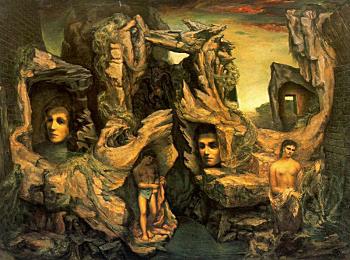
The Nerve Garden
1946
James Gleeson
b. Nov. 21, 1915
_______________________
What Uncle Sam Has to Tell His Creditors
The Myth of Americans as an "Indispensable People"
Paul Craig Roberts
_______________________
Ballad on the South Sea Scheme
Jonathan Swift
There is a gulf, where thousands fell,
Here all the bold adventurers came,
A narrow sound, though deep as hell,
'Change alley is the dreadful name.
Subscribers here by thousands float,
And jostle one another down,
Each paddling in his leaky boat,
And here they fish for gold and drown.
Now buried in the depths below,
Now mounted up to heaven again,
They reel and stagger to and fro,
At their wits' end, like drunken men.
Meantime secure on Garway cliffs,
A savage race, by shipwrecks fed,
Lie waiting for the founder'd skiffs,
And strip the bodies of the dead.
via 3quarksdaily
_______________________
The Sucker Bait Called Hope
Making the best of a slow apocalypse
Joe Bageant
... we go into a new year with millions of Americans still clinging to The Audacity of Hope. And we do so because we are victims of learned helplessness, learned from the cradle as it is rocked by the foot of the Capitalist consumer state. Sure we can hope for movement away from domination of the weak by the arrogant, away from ecocide and genocide toward a better world. What the hell, hope in one of the few free activities in this society. We don’t even have to put down the remote and get off our asses to do it. In fact, its delivered through television.(....)
Most Americans, regardless of their political leanings or religion, would not recognize the common good if it bit ‘em in the ass. We have no genuine concept of common good. We really don’t. Tocqueville observed that 170 years ago. He said that in America, no man owes another man anything. Nor is he owed by any other man. Where does that leave any movement toward the common weal requiring the cooperative efforts of more than one man?(....)
Meanwhile, thanks to the doctrine of no man owing another, this doctrine of not being our brother’s keeper in any important way, we are left with the social ethic of “every man for himself. Damned all social taxes and collective effort, I’ll claw down my own share, and let the devil take the hindmost. Hell, maybe I’ll even end up there on the 45th floor among the quail eaters with a blonde waiting in the sack. Land of boundless opportunity, right? ”(....)
Most people reading this understand that we can never again be what we once were … a civilization occupying a relative material paradise through a danse macabre of unsustainable growth through resource depletion. So no matter how much we hear about political change, no politician can save us. Because no presidential candidate can run on the promise that “If we do everything just right, pull in our belts and sacrifice, we can at best be a second world nation in fifty years, providing we don’t mind the lack of oxygen and a few cancers here and there.”
Still, there is choice available, even a superior choice: Accept the truth and act upon it. We can at the very least say no to scorched babies in Iraq. We can refuse to participate in a dead society gone shopping. That in itself can be called embracing the spirit. It won’t accomplish shit, but it is nevertheless the right thing to do. Because it’s the only just thing left to do. Too late, for sure, but better than remaining a dysfunctional moral cretin. My inner scales tell me so.(....)
It will take an entire lifetime of commitment, and the world will continue to crumble around us even as we work. There will be not one ounce of public glory or reward during our lifetimes, not if we are doing it right. And if we turn a buck on it, we can be assured that we are playing the same game as the earth’s wrecking crew. Which is called irony, I guess.
Yet the reward lies right there before us. Knowing and observing the spirit in all things . . . even above life itself. It is the first fearful step . . . the first stone on the path to liberation. Anyway, that’s my take on things....(more)
_______________________
Uncritical Exuberance?
Judith Butler
_______________________
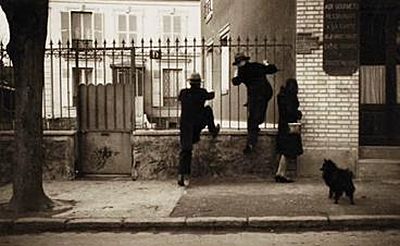
Descent of the Garden Fence
René Magritte
1928
_______________________
On Never Having Learned How to Live
Judith Butler
pdf download
survival is an original concept, that constitutes the very structure of what we call existence, da-sein if you wish. We are structurally survivors, marked by the structure of the trace, the testament. But having said that, I would not want to leave the interpretation according to which survival is closer to death than it is to life and the future. Here it seems to me that he refuses the Socratic claim to be closer to death.
And he turns the task, claiming that “all the time, deconstruction is in the
corner of the ‘yes’—the affirmation of life.”
I do not know if that can be fully true when I read the words that follow, the words that are meant to make sense of this notion of the affirmation of life. Here he is at the age of seventy-four, confessing quite openly that he has not learned a thing about how to live or how to die. And yet there is an affirmation that emerges in the place of this learning, from the matrix of this lack of wisdom, this uneducability. But it is perhaps important to remember that this is an author speaking, one who, by defi nition, loses his words in a very precise way when he speaks and when he writes: [W]hen one writes a book for a large audience, one doesn’t know to whom one speaks, one invents and creates outlines, but they no longer belong to us. Spoken or written, all these gestures leave us: they start to act independently of us, like machines or, at best, like puppets [. . .]. At the moment that I allow “my” book to be published (no one makes me do it), I begin to appear-anddisappear, like some unteachable ghost who never learned how to live. The trace that I leave signifi es to me both my death, either to come or already past, and the hope that it will survive me. It’s not an ambition of immortality, it’s structural; it is the constant form of my life. Every time I allow something to go forth, I see my death in the writing. The extreme test: one expropriates oneself—one gives oneself away—without knowing to whom one confi des the thing one leaves. Who will inherit it now and how? Will there even be inheritors? That’s a question that one can pose now more than ever. It preoccupies me ceaselessly. Differences 16.3- Derrida
A Journal of Feminist Cultural Studies
links to individual articles
_______________________

detail
Anonymous woodcut printed board game
from the second half of the 16th century,
featuring a rustic military figure in the centre
carrying a flag inscribed "Capitano di Baroni".
Five Centuries of Board Games
Bibliodyssey
_______________________
Pen Ultimate / Bless thee! Thou art translated
Michael Handelzalts
haaretz
"It is strange that I, who spend all my days in transferring contents from one language to another, should boast of being monolingual. But in the final reckoning maybe there is no contradiction here: The word that springs as a replacement for the foreign word becomes essential and irreplaceable within the boundaries of the Hebrew text you have created."
- Shimon Sandbank
For Sandbank, Hebrew is "immediate." The Hebrew word he uses for "immediate" is mimeila'it, based on the Hebrew expression mimeile, which comes from the Aramaic word meile, meaning "self-evident," and is very commonly used in modern Hebrew. When Sandbank uses it in its rather unusual adjectival form, he makes it less self-evident for his Hebrew readers. And that's what literature is all about.
Indeed, one of the rare achievements of literature - the art that is made of words - is creating the fleeting moment of doubt and hesitation, which saves the words from becoming self-evident or too immediate. Only when the words complete the parabolic trajectory (parabole from the Greek later became parle in the Romanic languages) between the deep and dim place within the reader, giving rise to many options for the same thing or concept in a few other languages, can they land in the precise spot that feels right and has the right meaning....(more)
_______________________
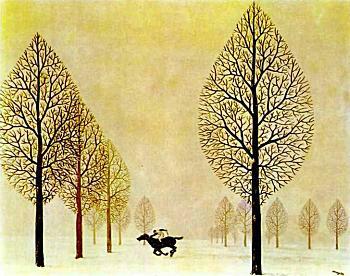
The Lost Jockey
René Magritte
1948
_______________________
Eliot Gelwan has a new home for Follow Me Here where he recently (14 Nov 08) celebrated its ninth birthday.
Congratualtions Eliot, and thanks for your continuing presence over the years.

Jack Owens
Bentonia, MS
Stones In My Pathway
Photographs of Mississippi Blues Culture
Bill Steber
photo essay and sound files
The Digital Journalist
I got stones in my passway
And my road seems dark at night
I got a pain in my heart
It has taken my appetite
-
Robert Johnson, "Stones in my Passway"
_______________________
Ship of fools
Political parties die from the head down
The Economist
Richard Weaver, one of the founders of modern conservatism, once wrote a book entitled “Ideas have Consequences”; unfortunately, too many Republicans are still refusing to acknowledge that idiocy has consequences, too.
_______________________
Giving Up on God
Kathleen Parker
As Republicans sort out the reasons for their defeat, they likely will overlook or dismiss the gorilla in the pulpit.(....)
To be more specific, the evangelical, right-wing, oogedy-boogedy branch of the GOP is what ails the erstwhile conservative party and will continue to afflict and marginalize its constituents if reckoning doesn't soon cometh.
Simply put: Armband religion is killing the Republican Party. And, the truth -- as long as we're setting ourselves free -- is that if one were to eavesdrop on private conversations among the party intelligentsia, one would hear precisely that....(more)
_______________________
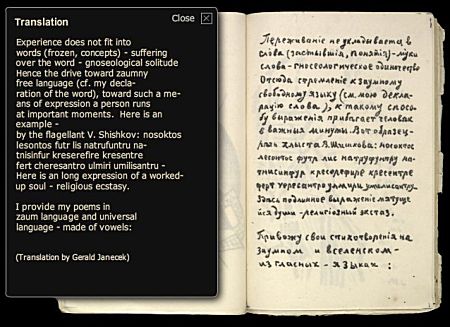
Explodity
Alexei Kruchenykh
imagery by Natalia Goncharova
Nikolai Kulbin, Kazimir Malevich
and Olga Rozanova
1913
Tango with Cows
Book Art of the Russian Avant-Garde, 1910-1917
Read translations and hear poems spoken aloud in Russian.
Curator's Essay
Nancy Perloff
The painterly component of Russian Futurism, called "Cubo-Futurism," drew upon the Cubist dissolution of the body into geometric planes and upon the Hylaean poets' reawakening of ancient primitive and sacred traditions. Natalia Goncharova and Mikhail Larionov introduced Neoprimitivism in December 1909, when they displayed their paintings alongside folk, primitive, and religious objects, including ancient Scythian sculpture of the southern Russian Steppes (kammenye baby), lubki (popular prints), icon paintings, and embroidery. Their parodic recasting of archaic forms and their secular representations of Orthodox imagery paralleled Khlebnikov's transformations of Russian words and Alexei Kruchenykh's crude and nonsensical word combinations. Poets and painters thus sought to express the dialogue between the ancient and modern, past and present, and sacred and secular that characterized modern Russian culture....(more)
_______________________

A Game in Hell [pdf]
Velimir Khlebnikov, Aleksei Kruchenykh
Natalia Goncharova
1912
_______________________
Enlightenment past and to come
Jacques Derrida
edited extract from one of his last speeches
Translated by Gulliver Cragg
I would like to cite Ignacio Ramonet’s "Resistance", an editorial written for the 50th anniversary issue in May. I agree with every no and yes in that piece, but I would like to single out one yes for special emphasis: the yes to a less market-dominated Europe. To me, that means a Europe that is neither content merely to compete with other superpowers, nor prepared to let them do as they please. A Europe whose constitution and political stance would make it the cradle of counter-globalisation, its driving force, the way alternative ideas reach the world stage, for example in Iraq or Israel-Palestine.
This Europe, as a proud descendant of the Enlightenment past and a harbinger of the new Enlightenment to come, would show the world what it means to base politics on something more sophisticated than simplistic binary oppositions. In this Europe it would be possible to criticise Israeli policy, especially that pursued by Ariel Sharon and backed by George Bush, without being accused of anti-semitism. In this Europe, supporting the Palestinians in their legitimate struggle for rights, land and a state would not mean supporting suicide bombing or agreeing with the anti-semitic propaganda that is rehabilitating (with sad success) the outrageous lie that is the Protocols of the Elders of Zion. In this Europe it would be usual to worry both about rising anti-semitism and rising Islamophobia. Sharon and his policies are not directly responsible for the rise of anti-semitism in Europe. But we must defend our right to believe that he does have something to do with it, and that he has used it as an excuse to call European Jews to Israel.
In this Europe it would be possible to criticise the policies of Bush, Cheney, Rumsfeld and Wolfowitz without being accused of sympathy for Saddam Hussein and his regime. In this Europe no one would be called anti-American, anti-Israeli, anti-Palestinian or Islamophobic for allying himself with those Americans, Israelis or Palestinians who bravely speak out against their own leaders,often far more vehemently than we do in Europe.
That is my dream. I am grateful to all those who help me to dream it; not only to dream, as Ramonet says, that another world is possible, but to muster the strength to do all that is needed to make it possible. This dream is shared by billions of men and women all over the world. Some day, though the work may be long and painful, a new world will be born....(more)
_______________________
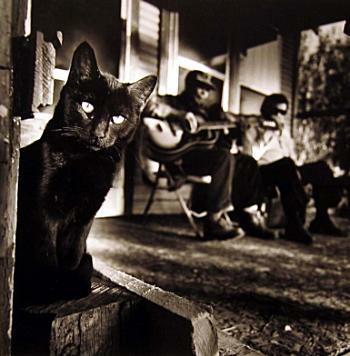
Bentonia Blues
Bill Steber
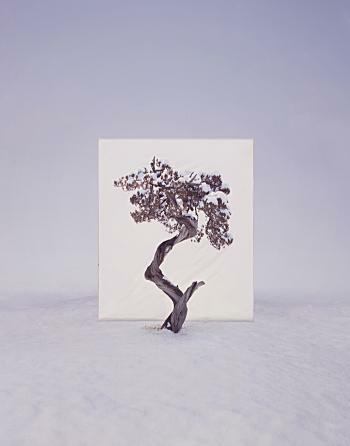
Forest for the Trees
by Myoung Ho Lee
Interview by Mike Smith
the morning news
_______________________
Zero confidence
Steven Lukes
eurozine
Durkheim called anomie "the malady of infinite aspiration". His central idea was that human beings need regulation – a framework of informal and formal rules that set limits to what they are entitled to expect, for instance, in the form of economic rewards. It is an idea that contrasts sharply with the culture of capitalism, not least its US version. Could there be any more striking contrast with his idea than the culture of Wall Street and the City of London in the last three decades? Durkheim, who was a late-ninetheenth-century socialist, hoped to "moralise" capitalism – a notion that has, perhaps, a somewhat conservative ring. But recall RH Tawney, egalitarian socialist, who once wrote a pamphlet called The Sickness of the Acquisitive Society.
Anomie, for Durkheim, manifests itself in times of economic disasters, when
a kind of declassement occurs, suddenly thrusting certain individuals into a situation inferior to the one they occupied hitherto. They must therefore lower their demands, restrain their wants, learn greater self-control [...| they are not adjusted to the condition imposed on them and they find its very prospect intolerable; thus they experience suffering.
And it is also found during crises of prosperity when the scale regulating needs
is upset; but a new scale cannot be improvised [...]. One no longer knows what is possible and what is not, what is just and what is unjust, which claims and expectations are legitimate and which are immoderate. As a result there is no limit to men's aspirations [...] appetites, no longer restrained by a disoriented public opinion, no longer know where to stop.
(....)
It seems to me that many questions about the future of capitalism as we have known it are raised by the current economic crisis. Already various developments that were unthinkable in the United States have become accepted as necessary: state part-ownership of financial institutions, massive state involvement in regulating financial markets, and so on. European leaders are already pronouncing American-style capitalism in some way inferior to a supposedly morally superior European variant. Thus President Sarkozy of France has said that the world needs to "bring ethics to financial capitalism". Will we start to consider the morality of capitalism as a matter of wide-ranging public debate? If so, there could be no better place to start the discussion than Durkheim's Suicide....(more)
_______________________
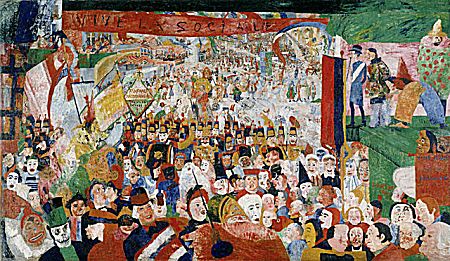
Christ's Entry into Brussels
1889
James Ensor
_______________________
A Second Autumn
Bruno Schulz
translated by John Curran Davis
...further still, deep inside that country inhabited by a carefree populace of jesters, harlequins and bird fanciers with their cages, in that country with no earnestness and no reality, little Turkish women patted with their plump hands honey cakes arranged on boards, and two boys wearing Neapolitan hats carried a basket full of cooing pigeons on top of a pole, which bends a little under that warbling, winged burden. And deeper still, at the very edge of the evening, on the last fragment of the earth where a withering tuft of acanthus sways on the dull-golden borderline of nothingness, a game of cards was still being continually played out, a last human resort before the great night which was approaching.
That whole lumber room of old beauty had been subjected to woeful distillation under the pressure of interminable years of monotony.
‘Can you understand,’ my father asked, ‘what the despair of that condemned beauty means, its days and its nights? Over and over again, it rouses itself to illusory auctions; it enacts profitable sales, crowded and raucous exhibitions; it is thrilled by a wild gamble and sells off its stocks in fear of a slump; it scatters them with an extravagant gesture; it squanders its wealth, only to realise upon sobering up that it had all been for nothing, that it had not escaped the closed circle of perfection to which it is condemned, and that it cannot alleviate the ache of its surfeit. No wonder that the impatience, the helplessness of that beauty had in the end to become mirrored in our sky, to flare up radiantly over our horizon, and to deteriorate in those atmospheric juggleries, those enormous and fantastic, cloud-enveloped arrangements which I call our second, our pseudo-autumn. This, our province’s other autumn, is nothing more than an ailing fata Morgana, radiated onto our sky in a magnified projection, from the moribund, incarcerated beauty in our museums. This autumn is a great wandering theatre of mendacious poetry, an enormous, colourful onion peeling away skin after skin in an ever-newer panorama. Never to arrive at any core. As it wilts and curls up, with a rustle, a new and radiant backdrop appears bhind each coulisse, lively and real for a moment before, expiring, it no longer discloses its paper constitution. And all the perspectives are painted, and all the panoramas are cardboard, and only the scent is real, the scent of the withering coulisses, a scent of great wardrobes full of lipstick and incense. And at twilight: that great disorder and tangle of scenery, that confusion of discarded costumes, among which one wanders as if in rustling withered leaves. And there is great mayhem, and everyone pulls at the curtain ropes, and the sky, the great autumnal sky, hangs in shreds of backdrops and is filled with the creaking of pulleys. And that hasty fever, that breathless and belated carnival, that panic of early-dawn ballrooms, and a tower of Babel of masks that cannot find the costumes they belong to....(more)
The Sanatorium at the Sign of the Hourglass
Bruno Schulz's Storiestranslated by John Curran Davis .....................................................
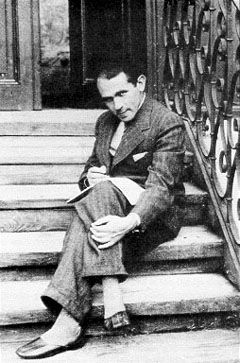
Bruno Schulz
July 12, 1892 – November 19, 1942
The Submerged Prophet
Agnieszka Maria Wasieczko
Bruno Schulz's Poetics:
Some Quotes from Schulz's Letters and Other Writings
The Street of Crocodiles
Bruno Schulz
translated by Celina Wieniewska
google books
The Mythologization of Reality
Bruno Schulz
Translated by John M. Bates
Bruno Schultz in Amber: The Demons
George Szirtes
_______________________
No More Torture
Eugene Robinson
We will look back on the Bush years and find it incredible, and disgraceful, that individuals were captured in battle or “purchased” from self-interested tribal warlords, whisked to Guantanamo, classified as “enemy combatants” but not accorded the rights that status should have accorded, held for years without charges—and denied the right to prove that they were victims of mistaken identity and never should have been taken into custody. (....)
Years from now, we will know the full truth of the clandestine CIA-run prisons where “high-value” terrorism suspects were interrogated with techniques, including waterboarding, that both civilized norms and international law have long defined as torture. From what we already know, it’s hard to say which is more appalling—the torture itself, or the tortured legal rationalizations that Bush administration lawyers came up with to “justify” making barbarity the official policy of the United States government. ...(more)
.....................................................
Broken Laws, Broken Lives:
Medical Evidence of Torture by US Personnel and Its Impact.
Physicians for Human Rights
Guantanamo and Its Aftermath: U.S. Detention and Interrogation Practices and Their Impact on Detainees
Berkeley's Human Rights Center, in conjunction with the International Human Rights Law Clinic and Center for Constitutional Rights
via American Torture
_______________________
 Paris
1932
LIFE photo archive
hosted by Google
via mosses from an old manse
_______________________
Two myths that keep the world poor
Vandana Shiva
the world suddenly seems to be full of high-profile people with their own plans to end poverty. Jeffrey Sachs, however, is not a simply a do-gooder but one of the world's leading economists, head of the Earth Institute and in charge of a UN panel set up to promote rapid development. So when he launched his book The End of Poverty, people everywhere took notice. Time magazine even made it into a cover story.
But, there is a problem with Sachs' how-to-end poverty prescriptions. He simply doesn't understand where poverty comes from. He seems to view it as the original sin. "A few generations ago, almost everybody was poor," he writes, then adding: "The Industrial Revolution led to new riches, but much of the world was left far behind."
This is a totally false history of poverty.The poor are not those who have been "left behind"; they are the ones who have been robbed. The wealth accumulated by Europe and North America are largely based on riches taken from Asia, Africa and Latin America. Without the destruction of India's rich textile industry, without the takeover of the spice trade, without the genocide of the native American tribes, without African slavery, the Industrial Revolution would not have resulted in new riches for Europe or North America. It was this violent takeover of Third World resources and markets that created wealth in the North and poverty in the South.
Two of the great economic myths of our time allow people to deny this intimate link, and spread misconceptions about what poverty is.
First, the destruction of nature and of people's ability to look after themselves are blamed not on industrial growth and economic colonialism, but on poor people themselves. Poverty, it is stated, causes environmental destruction. The disease is then offered as a cure: further economic growth is supposed to solve the very problems of poverty and ecological decline that it gave rise to in the first place. This is the message at the heart of Sachs' analysis.
The second myth is an assumption that if you consume what you produce, you do not really produce, at least not economically speaking. If I grow my own food, and do not sell it, then it doesn't contribute to GDP, and therefore does not contribute towards "growth"....(more)
_______________________

Peculiar Instects
1888
James Ensor
d. Nov. 19, 1949
_______________________
from
Myth of the Blaze
by George Oppen
.....
adventurous
words a mountain the cliff
a wave are taxonomy I believe
in the world
because it is
impossible the shack
on the coast
under the eaves
the rain barrel flooding
in the weather and no lights
across rough water illumined
as tho the narrow
end of the funnel what are the names
of the Tyger to speak
to the eyes
of the Tiger blaze
of the tiger who moves in the forest leaving
no scent
but the pine needles’ his eyes blink
quick
in the shack
in the knife-cut
and the opaque
white
bread each side of the knife
...(more)
.....................................................
Believing in the World Because It Is Impossible
Al Filreis
jacket
The blaze in George Oppen’s “Myth of the Blaze,” a great poem of war, sectarian ethics and personal guilt, is the burning bright of Blake’s “tyger” in the poem (and indeed spelled that way). Oppen’s sense of Blake’s “forests of the night”: the woods of the so-called Bulge in the horrendous battle of that name, the Rhineland campaign of winter 1944, the oblique tortured approach to the Rhine through France. “Did he who made the Lamb make thee?” This is a story of tiger and lamb....(more)
_______________________
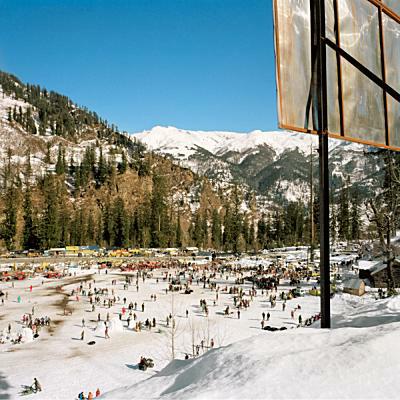
Farhard Bomanjee
via Mrs. Deane

The Evening Visitor
Jean Paul Lemieux
(1956 )
_______________________
Is "Against Theory" a Pragmatism?
Paul Grimstad
The Minnesota Review
Pragmatism's injunction to abandon metaphysics might then be thought of as setting the stage for the radically different idioms of Heidegger's ontology and Carnap's logicism, or what is sometimes called the Continental/analytic divide (see Follesdal and Friedman).
We should see "Against Theory" as a literary-critical avatar of this agon of intellectual temperament, but one in which the different sides of the divide are conflated through a complex (and in some ways unconscious) inheriting of pragmatism's role in setting twentieth-century philosophy down these peculiarly incompatible paths. If the "theory" they attack is the offspring of a certain strain of French Heideggerianism—a Derridean inheritance, referenced in "Against Theory" in an Americanized, New Critically-inflected Paul de Man—then the language they adopt to attack it might be traced back to the analytic philosophy exemplified in Carnap (or perhaps the early Wittgenstein). Considering this set of inheritances, the essay's target should not be seen as the tendency in literary criticism toward theoretic generalization, for as we have already pointed out the very premise of "Against Theory" is itself a colossal generalization about the identity of meaning and intention. Rather, the essay should be read as a (complexly equivocal) attack on a whole ideology of theory as "non-sense," in which the bitingly direct sentence is designed to replace Continental wooliness....(more)
_______________________
The International Literary Quarterly: Issue 5
Four Poems from Edward Hopper
Ernest Farrés
Translated from the Catalan by Lawrence Venuti
Planetary American Literature: Jonathan Franzen and Dave Eggers
Paul Giles
.....................................................
Imagining Posterity, then and now
Gillian Beer
Will posterity be very different from us? Even if we continue to look alike we may not be alike. In ‘Heredity’ Thomas Hardy gives a voice to the family face:
I am the family face;
Flesh perishes, I live on,
Projecting trait and trace
Through time to times anon,
And leaping from place to place
Over oblivion.
But that face gives no assurance of recognition. The conditions of life change life, yes. So people’s judgments and the forms of their desires are likely to change. But the passions of the infant surviving in each of us are recalcitrant to change. Those infantile passions may be our one kinship and continuity with posterity.
Posterity is a secular concept. It involves no transcendence, though it frequently includes the hope of improvement. In eschatological systems such as Marxism its role is to provide hope, as if wisdom may be further accrued after revolution. In evolutionary theory the power of the individual to produce progeny, with their promise of further diversification through generations, signals at once the continuance and change of particular species. Evolutionary theory does not allow us to look far into the future. The processes of change within a long environment – itself composed of so many competing needs and desires – are so multifactorial that there is no telling what the outcomes may be. There is no long plan, no arc of teleology. Looking back, indeed, as Darwin insists, what we see is the vanishing of species, the collapse of history. The opposite of posterity is extinction. And extinction is ordinary, as Darwin everywhere recognises:
of the species now living very few will transmit progeny of any kind to a far distant futurity; for the manner in which all organic beings are grouped, shows that the greater number of species of each genus, and all the species of many genera, have left no descendants, but have become utterly extinct.
– though in the final paragraph of the Origin, on the next page, he insists on the capaciousness of survival and suggests a hierarchical activity for extinction: Natural Selection[entails] ‘Divergence of Character and the Extinction of less-improved forms.’ In his late Autobiography Darwin faced the extreme future, when the earth will grow too cold for life. He mourned the passing of what he hoped would by then be much improved forms of life, but he accepted its inevitability. Even posterity is a time-bound concept.
In the current nightmares of the future, posterity is called in evidence against us. We have defiled, defaced, distorted, the resources current in the world. Posterity will hold us to account and condemn us – if posterity survives to do so. Posterity may do so. But posterity probably won’t think about us very much. It will be preoccupied with its own concerns, and will take for granted the conditions in which it finds itself. It will, after all, be the present. So I disagree with the frequently expressed view, that without hope for posterity life becomes bleak and society self-destructs.
We may feel concern for posterity, but we can scarcely love it. It is the present we inhabit where love is felt. Literature and other arts can make portable that present, taking what was past into the future, realising it in the shifting now. I don’t deny that we may be squandering the future in our present behaviour. But those future generations will live out their time in an environment more probably changed than obliterated, and one that we cannot foresee. We may do our best, but we shouldn’t imagine that we can control what is to come, or that we shall be much remembered for good or ill in those changed times....(more)
thanks to Andrew Seal at Blographia Literaria
_______________________

El sueño de los pobres
[The Dream of the Poor]
1935
Lola Alvarez Bravo
1907-1993
wife of Manuel Alvarez Bravo
Lola Alvarez Bravo ... in the light of the reflectors _______________________
The G-20 Washout
Mike Whitney
The financial crisis is being used by Wall Street big-wigs to restructure the economy and create a permanent class of working poor.
The world doesn't need a new Breton Woods or a new world order; it needs a competing vision of global finance. One that will put an end to dollar tyranny, superpower politics and "beggar thy neighbor" economic policies. A system that strengthens national sovereignty, cooperation, and international law. That's what the G 20 should have been talking about, instead of wasting their time trying to prop up a system that's rotten to the core. ...(more)
_______________________
The Great Depression of the 21st Century: Collapse of the Real Economy
Michel Chossudovsky
The upper spheres of Wall Street overshadow the real economy. The accumulation of large amounts of money wealth by a handful of Wall Street conglomerates and their associated hedge funds is reinvested in the acquisition of real assets.
Paper wealth is transformed into the ownership and control of real productive assets, including industry, services, natural resources, infrastructure, etc. (....)
Paper wealth accumulated through insider trading and stock market manipulation is used to acquire control over real economic assets, displacing the preexisting ownership structures.
What we are dealing with is an unsavory relationship between the real economy and the financial sector. The financial conglomerates do not produce commodities. They essentially make money through the conduct of financial transactions. They use the proceeds of these transactions to take over bona fide real economy corporations which produce goods and services for household consumption.
In a bitter twist, the new owners of industry are the institutional speculators and financial manipulators. They are becoming the new captains of industry, displacing not only the preexisting structures of ownership but also instating their cronies in the seats of corporate management....(more)
_______________________
US's Road to Recovery Runs Through Beijing
Francesco Sisci and David P Goldman
For the past decade, poor people in the developing world have financed the consumption of rich people in America. America has borrowed nearly $1 trillion a year, mostly from the developing world, and used these funds to import consumer goods and buy homes at low interest rates. The result is a solvency crisis of the American household, which shows up as a solvency crisis for financial institutions. _______________________
Naomi Klein on the Bailout Profiteers and the Multi-Trillion-Dollar Crime Scene
_______________________
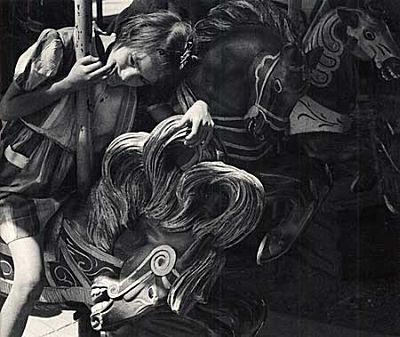
El Rapto
(Abduction)
Lola Alvarez Bravo
ca. 1940s
1 2
_______________________
Poems by Tsvetanka Elenkova
Translated by Jonathan Dunne
The International Literary Quarterly
Colours Are Laid In The Dark
At the beginning of every film, as at the end, there are several black frames where it is joined to the cartridge and to the spool of the camera so that it can rewind, so that it isn’t exposed. While in the cartridge, the whole film is black. If it has advanced and you open it in the light, it also turns black. So sensitive on the road to Damascus or some other city. Colours are laid in the dark only with measured light. As much as filters through a straw hat or a pair of sunglasses. A flash. And when it’s processed we look at the pictures.
...(more)
_______________________
Michel Foucault, Philosopher? A Note on Genealogy and Archaeology [PDF]
Rudi Visker
parrhesia: a journal of critical philosophy
issue five
via infinite thØught
_______________________
The Moose Stops Here
Frank Rich
Election junkies in acute withdrawal need suffer no longer. Though the exciting Obama-McCain race is over, the cockfight among the losers has only just begun. The conservative crackup may be ugly, but as entertainment, it’s two thumbs up!(....)
The G.O.P. ran out of steam and ideas well before George W. Bush took office and Tom DeLay ran amok, and it is now more representative of 20th-century South Africa during apartheid than 21st-century America. The proof is in the vanilla pudding. When David Letterman said that the 10 G.O.P. presidential candidates at an early debate looked like “guys waiting to tee off at a restricted country club,” he was the first to correctly call the election.(....)
The Republicans did this to themselves, yet a convenient amnesia can be found in conservatives’ post-Election Day soul searching. There’s endless hand-wringing about Bush and McCain blunders and Abramoff-Stevens corruption, but there’s barely any mention of the nasty cultural brawls that defined the G.O.P. campaign narrative this year as the party clung bitterly once more to its 40-year-old “Southern strategy.”...(more)
_______________________
The Center-Right Nation Exits Stage Left
Tod Lindberg
_______________________
No More Mangers:
Talibangelicals Celebrate Torture Death of Christ By Selling Christmas-Spirit-y Electric Burning Crosses
No Blood for Hubris
_______________________

Red Scene
1933-6
Percy Wyndham Lewis
November 18, 1882 - March 7, 1957
_______________________
America’s Wars of Self-Destruction
Chris Hedges
War is a poison. It is a poison that nations and groups must at times ingest to ensure their survival. But, like any poison, it can kill you just as surely as the disease it is meant to eradicate.(....)
if Barack Obama drinks, as it appears he will, the dark elixir of war and imperial power offered to him by the national security state, he will accelerate the downward spiral of the American empire.
_______________________
Georgia and Russia: the aftermath
Donald Rayfield
Why Did the West Ignore the Truth About the War in Georgia?
The US and UK left the impression that Russia was the guilty party
Mary Dejevsky
How US claims about Syria became media facts
Unwary journalists who repeat US army claims about Syria and Iraq become tools in a propaganda war
Sharif Nashashibi
_______________________

Skeleton Cave (1954)
Cora Cheney
I well remember bringing this home from
John McCrae Public School in Riverside (Windsor) - mw
Nostalgia for the Scholastic Book Club, circa '60's & '70's
via Levi Asher
Literary Kicks
_______________________
From Wildwood
a novel-in-progress by Tanyo Ravicz
The International Literary Quarterly
I have come to recover the lost survey lines on a parcel of state land which I intend to make my own. Northwest gales confined me to Kodiak town for three days before a Super Cub on floats was able to set me down in this bight on the north shore of the island. The pilot saw treacherous-looking rocks looming under the water, and not wanting to put a hole in his floats he actually landed me two miles east of my goal in country he’s more familiar with. Now that he’s gone, I’m filled with cautious excitement, hoisting my pack and stepping across the beach. The air is quiet and all the proportions of life seem altered. Up on the cliffs there’s the skeleton of a cabin, and the beach is strewn with the relics of a boat wreck. Something I have noticed before in Alaska: what the human element loses in eminence, it gains in tragic grandeur. Here is the rusty, barnacled box of a diesel engine stamped Detroit, and here’s a broken foredeck pierced with hand-forged nails....(more)
_______________________
Louis Zukofsky: New Author Page
PennSound

Toshio Shibata Tepper Takayama Fine Arts
Photography
1 2 3
_______________________
no man’s land #3 – Winter 2008/2009 Online Now
German literature in translation
promenade toward fungi, eumenides discussion & canalisation
Bert Papenfuss
translated by Rosmarie Waldrop
cows, cows, cows; cow flops & coltsfoot I suppose
& black berries, the gate of fame sank in the brambles
brollacham & buhmann snuggeled in the basalt column quarry
right of the rhine and cisalpine wishsausaging wallowed
reticence & unprofessionality hours on tabula
drugs that mugged, love to the death your threat
but I won’t suffer it, rather die myself
tracked by a squadron of mediawise con men
snapped the schnapsnosed mammal thrice for air
his hellhound round the bend strolled on stormwatch
& we skulked bed-& bulletward into an inn
each thinking he gave more, than he took
& this loss is the so-called evil in the world
that never errs, we concurred; nonesoever twosoever
none, nothing, hardly even naught: go rest among the alders
via Dwayne D. HayesAbsinthe Minded
_______________________

A Boat-Builder's Yard
Francis Danby
b. Nov. 16, 1793
_______________________
For the answer to the question, ‘Why do American liberals carry on about racism and sexism when they should be carrying on about capitalism?’, is pretty obvious: they carry on about racism and sexism in order to avoid doing so about capitalism. Either because they genuinely do think that inequality is fine as long as it is not a function of discrimination (in which case, they are neoliberals of the right). Or because they think that fighting against racial and sexual inequality is at least a step in the direction of real equality (in which case, they are neoliberals of the left). Given these options, perhaps the neoliberals of the right are in a stronger position—the economic history of the last thirty years suggests that diversified elites do even better than undiversified ones. But of course, these are not the only possible choices.
- Walter Benn Michaels, Against Diversity
_______________________
Operation Enduring Disaster
Breaking with Afghan Policy
Tariq Ali
Obama would be foolish to imagine that Petraeus can work a miracle cure in Afghanistan. The cancer has spread too far and is affecting U.S. troops as well. If the American media chose to interview active-duty soldiers in Afghanistan (on promise of anonymity), they might get a more accurate picture of what is happening inside the U.S. Army there.
I learned a great deal from Jules, a 20-year old American soldier I met recently in Canada. He became so disenchanted with the war that he decided to go AWOL, proving -- at least to himself -- that the Afghan situation was not an inescapable predicament. Many of his fellow soldiers, he claims, felt similarly, hating a war that dehumanized both them and the Afghans. "We just couldn't bring ourselves to accept that bombing Afghans was no different from bombing the landscape" was the way he summed up the situation. (....)
Domestic pressure in the U.S. to pull out of Afghanistan remains weak, but could grow rapidly as the extent of the debacle becomes clearer and NATO allies refuse to supply the shock-troops for the future surge.
In the meantime, they're predicting a famine in Afghanistan this winter. ...(more)
.....................................................
No End to the Savagery in Afghanistan
Robert Fisk
Back in Afghanistan, the mind turns to the small matter of savagery. Not the routine cruelty of war, but the deliberate inhumanity with which we behave. The torture and killing of prisoners in this pitiful place—the American variety in Bagram and the Taliban variety in Helmand—is a kind of routine of history. Even execution has to be made more painful. A knife is more terrible than a bullet. The cult of the suicide bomber in the Middle East began its life in Lebanon, moved to “Palestine”, arrived in Iraq, leached over the border here to Afghanistan and passed effortlessly through the Khyber Pass into Pakistan. And New York. And Washington. And London ...(....)
Such cruelty is abetted with a bodyguard of clichés—“police operations”, “clean up”, “mop up”, “surgical strikes”—where you can kill by remote control, “especially when the media are not present to show the realities of a conflict”. This is most certainly the case today, for what journalist will now dare to wander the village streets of Helmand or the city of Baquba in Iraq or, for that matter, the border towns of Pakistan? War has never, it seems, been so underreported. And both the good guys and the bad guys like it that way; they prefer to indulge in savagery unseen....(more)
_______________________

Weir Dam
Sullivan County, TN
Toshio Shibata
_______________________
from Archicembalo
G.C. Waldrep
conjunctions
What Is The Real Answer
There is this high keening I can do nothing about. It is the source of many things. The breaking of bread, for instance. A concealed (refr)action. There are small armies among us, and they seek out the most moist places.
Every sound is tropical, every sound is perishable. My aunt sends one wrapped in butcher paper & string. I refuse to open it and so it remains on a shelf next to Blackwell's Curious Herbal and a bag of homemade noodles, quivering.
In the eighteenth century it was not uncommon for large landowners to conclude that nursemaids were spies. Dear outrageous cataleptic inhibitor, their letters would begin, Dear Anglophone gasconade. Heft of a pomegranate. I add cider vinegar, I add extra oil. Knead until the muscles of each palm register their pulsed exequies. The honey, the redress. The observer and the observed. With maturity becomes the desire to be asked, no longer to play the supplicant. When my Lord asks a question winter answers for me. Why I prefer doors to windows, bridges to saints. Why insist on scumble.
(Do we choose the means of our drowning? Or do others choose for us?)
At night in my room I practice each dance step, slowly, carefully. After the manner of an exile.
In this dream I wash locks, tubs of Yales, until my fingers begin to bleed. I splash sudsy water on the cold flagstones. No one else is around. Every now and then I think I hear a sound from the next room, but I am mistaken. ...(more)
_______________________

Hinohara Village, Tokyo
Toshio Shibata
_______________________
If the most secular of Western countries, France, became victim of the "Americanization", i.e. of "religization" of political discourse, then modern secularism is dead.
On Intelligent Design and the Left
Cats, Dogs and Creationism
Jean Bricmont
...there are two routes open to the believer. There is that of Sarah Palin, clinging literally to the belief system, in spite of all evidence to the contrary. That school of Christians enter into direct conflict with science. Or one can choose the metaphorical route, which most liberal and European Christians (including even the Pope, at times) follow -- declare that, whenever the Scriptures conflict with science, they have to be "interpreted" in a non-literal way. That leads to total defeat for religious belief, because, if the parts of the Scriptures that can be checked with the facts are not to be taken seriously, why pay any attention to the parts that cannot be checked (notably concerning Heaven and Hell or God himself )? The whole of liberal Christianity is the result of a double standard: follow the Scriptures whenever they are "metaphysical" or ethical and cannot be checked independently, and discard them when they can. Since God is not good enough to tell us what he really meant in his "revelations", and which parts have to be taken seriously and which parts not, we are left with total arbitrariness.
People who call themselves agnostics are often confused about these two notions of God. What they claim to be agnostic about is the philosopher’s god not, say, the Gods of Homer. With respect to the latter, they are atheist, just as all religious people are atheist with respect to all gods except their own.(....)
The problem for the American left is that, if nobody ever does anything to combat religious ideas, then, a century from now, any conceivable left will still be stuck with tens of millions of "fundamentalist" Christians who will vote "with their faith" against any rational or progressive policy and even against their own economic interests. It is true that it is an unpopular struggle -- but so was it in France in the 18th century. It is also true that the effects will only be felt in the long run -- but if nobody ever starts doing anything, nothing will ever change. The catastrophic impact of the Christian fundamentalists (without them, the world would probably not have had to suffer Reagan or Bush) is largely the result of the past indifference of the American progressives towards religion.
The deep reason why progressives should oppose religion is that it is irrational and arbitrary. A better world is necessarily a more rational world, a world where people search for solutions to human problems based on the facts of the world and with the help of reason. The Critique of Intelligent Design gives us an enjoyable and enlightening introduction to the philosophical underpinnings of such an attitude....(more)
_______________________
All the Languages in the World
Zbigniew Mentzel
Translated from the Polish by Antonia Lloyd-Jones
words without borders
Awakening
It was a terrible dream.
At first I couldn't find my bearings in it - I didn't know what I was actually dreaming about, what I felt afraid of, or what those big chunks of raw meat were supposed to be; despite being beaten to a bloody pulp, they were still showing signs of life.
Only a while later, when an image loomed out of the confusion, moved towards me and came into sharp focus did I catch sight of an infinite multitude of human tongues, torn from the living or the dead, tongues that somebody's invisible hands were using to erect a huge pyramid-shaped building, or else a sky-high sacrificial pyre.
I watched in horror as more and more tongues kept appearing: brown, livid blue, or almost black, and it looked to me as if thousands, millions of mouths still had power over them, for even as they joined up, lumped together and turned into the shapeless mass that was serving as a building material, never for a moment did they come to a standstill--they just kept on moving in feverish convulsions, as if the whole of mankind, cruelly mutilated, as if the whole world - our world - were . . . crying for help? Asking a question? Cursing? Praying? Begging for mercy?...(more)
_______________________
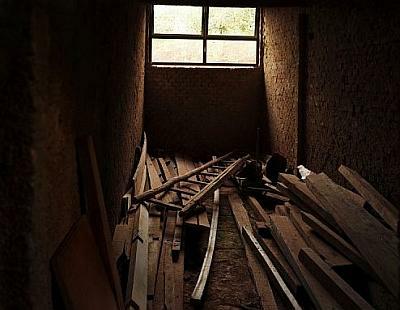
Asilo
Greg Miller
via Shane Lavalette
_______________________
Radical Psychology
A Journal of Psychology, Politics, and Radicalism
Volume Seven
via Philosophy's Other
The Psychotic Element in Everyday Group Thinking:
Reflections on the Salem Witch Trials
Diana Semmelhack and Larry Ende
Post Vietnam Syndrome:
National Identity, War, and the Politics of Humiliation
Myra Mendible .....................................................
“ ‘Are You Sure, Sweetheart, That You Want to Be Well?’ ”:
An Exploration Of The Neurodiversity Movement
Kathyrn Boundy
During a discussion of the embodiment of cultural knowledge and the ways in which (forced) assimilation can be experienced as a violation enacted in the deepest level of self, Jacqui Alexander quotes the opening scene of Toni Cade Bambara’s The Salt Eaters, in which one character asks another, ‘Are you sure, sweetheart, that you want to be well?’. This question gets at the heart of many of the issues with which the Neurodiversity movement and the people who identify themselves as part of the communities from which this movement stems are concerned. What does it mean to be ‘well’? Who is it that gets to decide if one is well or not? By what criterion is this decision made? Is it the subjective experience of the patient which determines wellness? The opinion of the medical community? The extent to which a person is able to blend effectively into the social and economic world, regardless of the possible cost to the person doing the blending? In a world in which emotional, perceptual, intellectual and interpersonal experience can come in many forms and configurations, who is it that must accommodate whom and to what extent? To what extent do the so-called ‘neurotypical’ have the right to enforce their social and behavioral rules and expectations on those whose ways of experiencing themselves and the world differs from the accepted norm?...(more)
_______________________

Imabari City
Ehime Prefecture
Toshio Shibata
_______________________
from
Draft 59: Flash Back
Rachel Blau DuPlessis
conjunctions
4.
Exam:
Why use the alphabet to organize,
or why not? Discuss.
Suggest another mechanism of order.
One form and then another.
Something that sort of ends, but sort of not.
The alphabet is existentially funny.
Lettristic vaudeville can be adequate.
I mean there's satisfaction arriving at
(English) "zed," and (American) "zee"
but no insistence that anything particular be.
Other end points where "arrival" is dissolved?
Maybe a grid with limits.
Maybe lengths of ribbon simply
cut to tie these presents.
Maybe qwerty or another
job-lot keyboard.
Pessoa's was azerty.
But this is controversy
without particular point. One form or then another--
it means something, but in itself leads nowhere.
A Form itself, abstract, is not
self-evident in meaning.
It's not one anything.
"Form" is its particular use
its histories and extensions, its situated outreach,
its power and prods.
Who has designs on us? and Why?
What is the force of our conviction?
Something had gotten away from us
urgency for justice, intensities of ire,
all of this.
Where is it?
What are the real goals of this desire?
...more
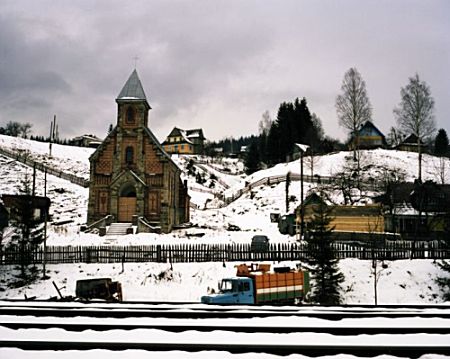
along some roads
Andres Gonzales
via Heading East
_______________________
Places don’t always travel with people
but the place that held my attention
for half my life still aggravates a flow
of associations. And when I write out
the points of entry into that discursive
instability, I remember those places as
the sites of danger. I think of the duplicity
of landscape images and text, those
photos of old men fishing, the paintings
and clever songs about place and
what is described in the follows—
the becoming, and then the disappearing,
the whirlpool in the center of the story of
the construction of locally produced landscape.
I put a river on a map. I can talk with conviction
About the Upper Nass. My home in Prince George
isn’t large or secluded. I live among the poor.
In my early days on the Nass, I spent much
of my time looking for food until I escaped.
Lan(d)guage
a sequence of poetics
Ken Belford
In Ken Belford's fifth book of poetry he takes us on a journey through Canada's roadless north where he has discovered a third world gaze, looking out at industrialism and its impact on a region abundant in resources and natural beauty. Lan(d)guage is an unsentimental and non-reactionary perspective, a deep investigation of the psychology of both the electronic revolution and postmodernism. It is also a collective conversation having to do with the mobile geographies of inequality. The poems are a study in the social cost of privilege and what it means to have access to power, surveillance and identity.
Ken Belford’s lan(d)guage
rob mclennan
_______________________
Homo horribilis
Ken Belford
I was sacrificed in politics on a sloping floor. If I could
close my eyes to the gap between ourselves and livestock
and the billions of animals in factory farms could stand
their bloody ground; and the bloodlines of the animals
who are not useful to men meant more than mere lives
that may be killed, and if all life was evident – if
the trade in heads was no longer kept alive, hooks
would straighten out and we would not just protect
and give prizes to the safe but make flourish poets
of resistance once again. The power to allow life would
extend to all living beings, but in the narrative,
the means are justified and called necessary suffering.
Ken Belford poems [PDF] Treeline 3
Orbits
Ken Belford
In theory, words crowd together
in traffic jams. Words enter and
exit the poem. Ellipses close in
on themselves. In the university,
the innermost poets whirl around
the center. Gravity is not an external
force but a product of the universities
and their orbit poets. There are two locations -
one inside the circle and one outside.
In between the two is the coronation circle.
When a poet enters the university,
banks lock them in. Interstellar poets
frequently collide and convert
their energy into shock waves.
The unstable poets move in lockstep
while the faster ones slow down
and the slower speed up. This is how
they bring themselves into synch.
The slower get hit by waves from behind.
Self reinforcing and amplified
by a variation in rates and proximity,
the barred poets follow the orbits.
It’s called a conference when
their poets randomly pass close
to each other. But they soon separate
again, not unlike cars on the highway.
Books occur when they rotate at the same rate.
_______________________
Viewed from the Mountains: A Conversation with Ken Belford [PDF]
The Ken Belford Issue
It's still winter:
a web journal of contemporary poetry and poetics
Vol. 7.1
_______________________
How Characters Became the Masters and the Author Their Apprentice
José Saramago
Nobel Lecture, December 7, 1998
Translated from the Portuguese: Tim Crosfield and Fernando Rodrigues
When painting my parents and grandparents with the paints of literature, transforming them from common people of flesh and blood into characters, newly and in different ways builders of my life, I was, without noticing, tracing the path by which the characters I would invent later on, the others, truly literary, would construct and bring to me the materials and the tools which, at last, for better or for worse, in the sufficient and in the insufficient, in profit and loss, in all that is scarce but also in what is too much, would make of me the person whom I nowadays recognise as myself: the creator of those characters but at the same time their own creation. In one sense it could even be said that, letter-by-letter, word-by-word, page-by-page, book after book, I have been successively implanting in the man I was the characters I created. I believe that without them I wouldn't be the person I am today; without them maybe my life wouldn't have succeeded in becoming more than an inexact sketch, a promise that like so many others remained only a promise, the existence of someone who maybe might have been but in the end could not manage to be....(more)
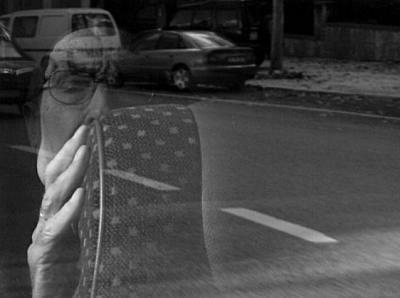
José Saramago
b. Nov. 16, 1922 O Caderno de Saramago
Jose Saramago' blog, started this fall in his 85th year.
in Portuguese
The Unexpected Fantasist
Fernanda Eberstadt
Religion feeds on death
Translation of La religión se alimenta de la muerte, an interview by Miguel Mora with José Saramago published in El País on 12-Nov-2005.
Zenit Translations
_______________________
In Favor of Sarcasm
Stan Apps
elective annoyance
The writer is free to create the fiction that human beings really care, that there is this intense and humane universal sense of care, and that that is the rectitude that underlines our self-righteousness. But the writer who creates that fiction is being a scoundrel, since she or he is actually collaborating with the conservatives to create a complaisant fiction. In fact, the inequity is right out on the table surrounded by genuine attitudes of indifference and annoyance at the ugliness of it all. Structural inequity is structural contempt, and contempt, not compassion, is the emotion that we cannot avoid since it is inscribed in the most basic levels of our social contract. Sarcasm is a net of whirling blades made out of ambient contempt. There are few legitimate responses to a world in which idealistic narratives are repeatedly used to devastate communities, where devastation is routinely applauded as long as it is for the sake of ideals. With ideals like these we don’t need enemies. The matter-of-fact and the sarcastic are tools for the combat against false ideals. And if the world is an onion with layer after layer of hypocrites, weeping as they’re pulled away? I think I would encourage individuals to avoid being hypocrites, to the extent that that is possible for them or anyone....(more)via Nick Piombino
_______________________
The Wild Wordsmith of Wasilla
Dick Cavett
What will ambitious politicos learn from this? That frayed syntax, bungled grammar and run-on sentences that ramble on long after thought has given out completely are a candidate’s valuable traits?
And how much more of all that lies in our future if God points her to those open-a-crack doors she refers to? The ones she resolves to splinter and bulldoze her way through upon glimpsing the opportunities, revealed from on high. via Joseph Duemer
_______________________
Sarah Palin: Gay Icon
Rohin Guha
...let's take this moment to remember her not only as a hateful loon who accidentally found herself lost in the American mainland, but also as a tailor-made gay icon -- the type of collectible Caribou Barbie doll whose accessories include a few pairs of shoes, baby Trig, and the obligatory hunting rifle.
_______________________
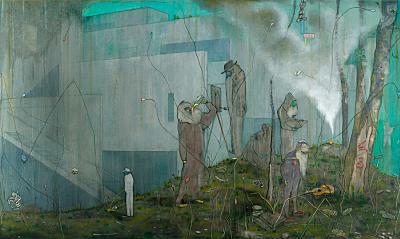
New Accursed Art Club
Nigel Cooke
1 2 3 4
_______________________
Good Times: Convergence, Conflict, & Chaos
Richard J. Cox
comments presented at the plenary session at the Association of Moving Image Archivists in Savannah, Georgia on November 13th.
Reading Archives
One of the primary issues archivists need to deal with in the Digital era is the notion that everything can be saved. The belief in this is pervasive, from individuals developing software, such as MyLifeBits, to record everything, to leaders (and many followers) in the library, information, and computer sciences fields who regularly state such a belief. The idea that everything can be saved may be the mantra of the digital true believer. Not only does this idea and its supporters ignore the other technical issues of retrieval, the ability to retrieve and retain important contextual meaning, and the costs of maintenance, the reason for or logic behind saving everything is usually avoided. It is interesting that many information professionals who have embraced the notion of adding value to the sources they administer are also so quick to embrace such utopian notions as utilizing the technology to save everything....(more)
_______________________

Paolo Pellegrin
Double Blind - War in Lebanon
Paolo Pellegrin
_______________________
Wear Good Shoes: Advice to young photographers
Alec Soth assembles 35 responses
magnum blog
Paolo Pellegrin
...every time you compose and release the shutter you give voice to your thoughts and opinions of the world around you. So other than the obvious patience (photography is a complex medium, a voice which requires time to develop) and perseverance and the necessary humility when dealing with others, I would recommend working to become a more developed and informed individual, a more knowledgeable and engaged citizen. This will translate into a deeper more complex understanding of the world around you, and ultimately into a richer and more meaningful photography.
...(more)
|
